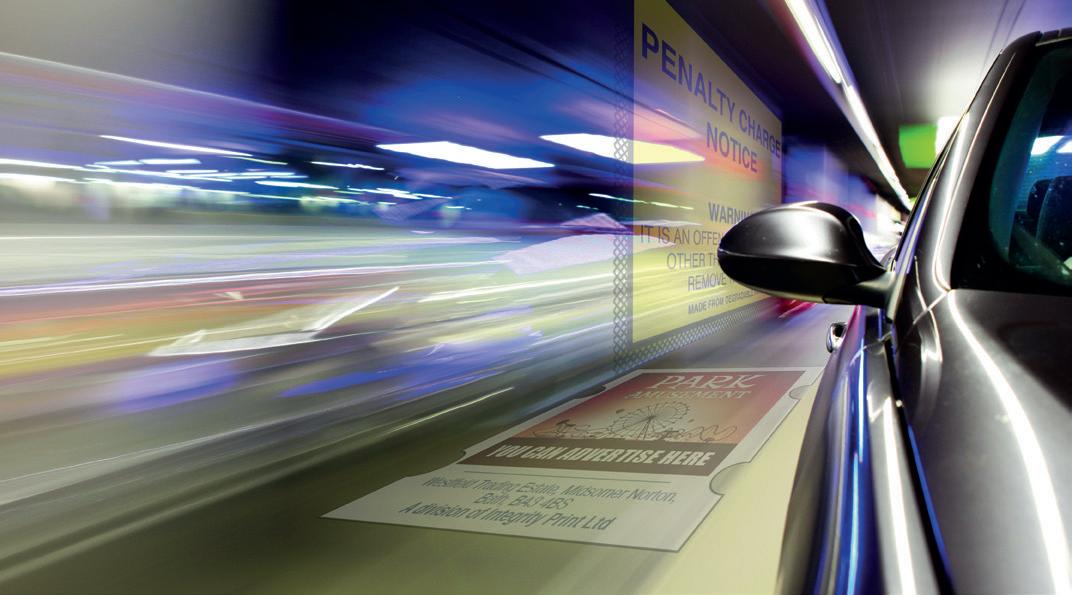














Parents want to keep their children safe, but bad parking is a dangerous activity
















Parents want to keep their children safe, but bad parking is a dangerous activity
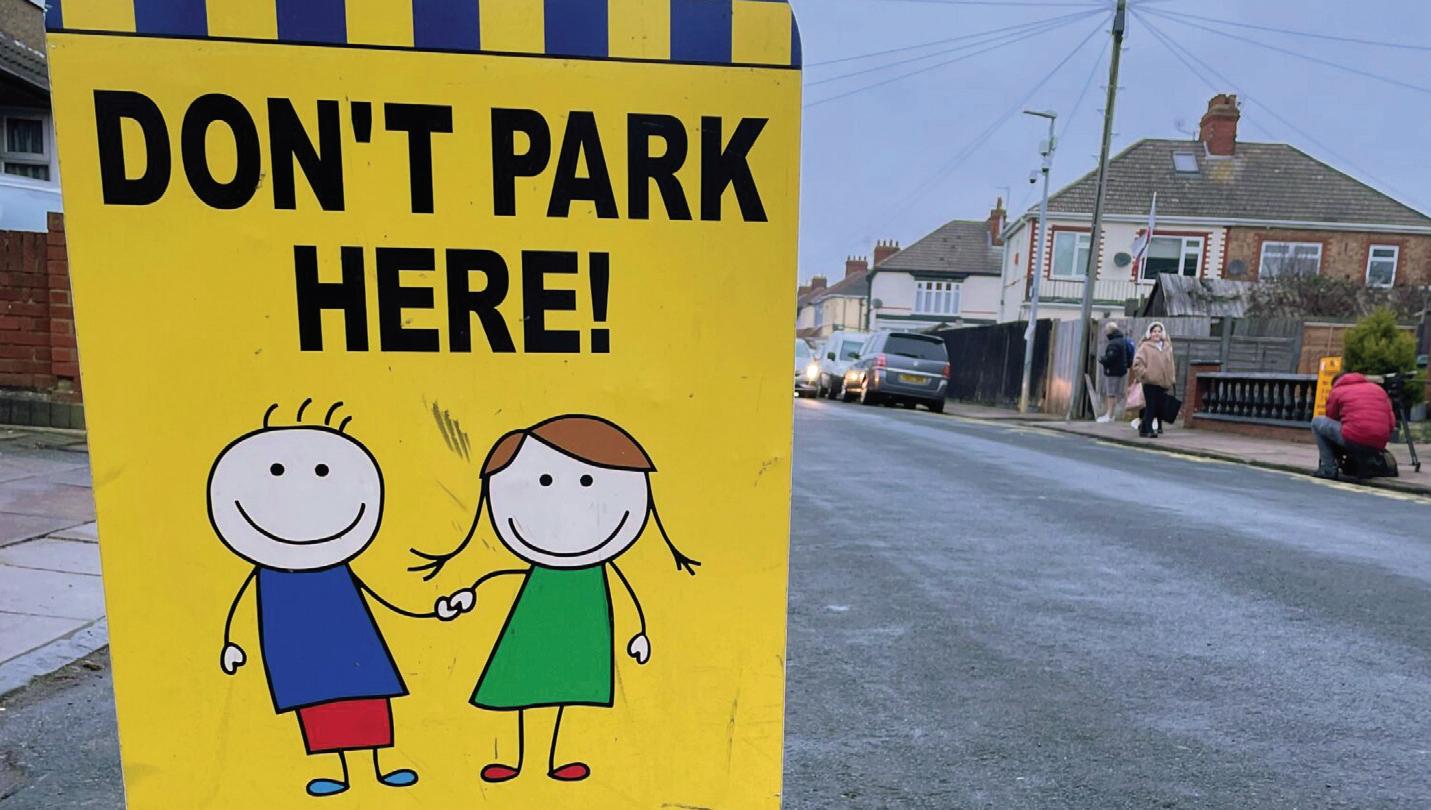

The fact that parents who are worried about protecting their children from harm sometimes end up parking in a manner that endangers other road users is one of the ironies of the school run. Sometimes, in the rush to get their children to school on time, it can be tempting for parents to pull onto the kerb or part way onto a driveway, to stop on zigzag lines or pull into a bus stop. While it may seem like a harmless thing to do, vehicles blocking pavements and footpaths often means pedestrians – who include young children, those with limited mobility and older people – are forced to go into the road.
There are solutions. Programmes such as School Streets restrict vehicle access to roads around schools at the start and end of the day. But just placing limitations on the use of cars can only go so far. School Streets need to be complemented by alternative options such as reliable and affordable public transport, dedicated school buses, the provision of safe footpaths, clearly marked cycle routes, and organised ‘walking buses’ and ‘bike buses’.
The School Streets conferences are a series of events run by Landor LINKS to provide a connective space in which local authorities, campaigners, parents groups and education providers can share best practice and innovative ideas. We hope you enjoy reading the articles these events inspire and look forward to seeing you at future School Streets conferences.
Mark Moran Editor










The British Parking Association and International Parking Community find common ground on regulating private land
Consumer group Which? warns drivers about the dangers of rogue adverts that take them to fake parking apps
Russell Hamblin-Boone shares highlights from the CIVEA Conference and the Enforcement Excellence Awards
Steph Bortoli and Olaseni Koya talk about how working with communities delivers better parking policies and programmes
Deniz Huseyin reports on the Solve the School Run campaign and West Yorkshire mayor Tracy Brabin’s School Streets plan
John Warne sets out steps car park operators can take to address the challenge of ever increasing car sizes
A round-up of car parks that have become recent winners of the Park Mark and Park Access accreditations

New developments in electric vehicles, AI and robotics

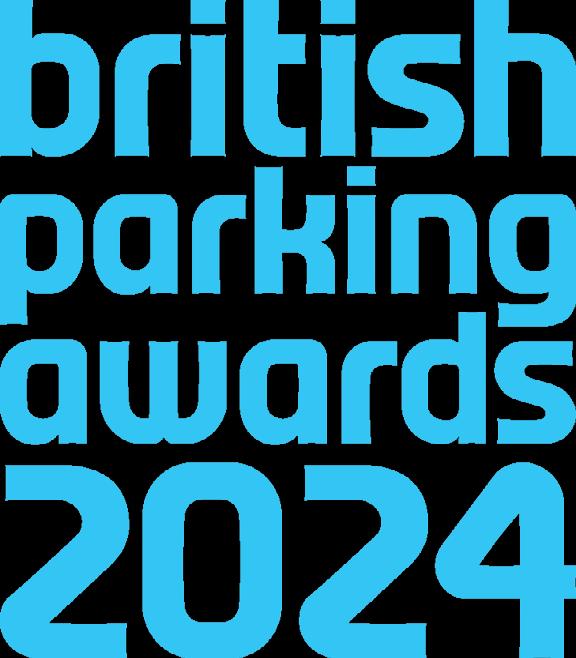

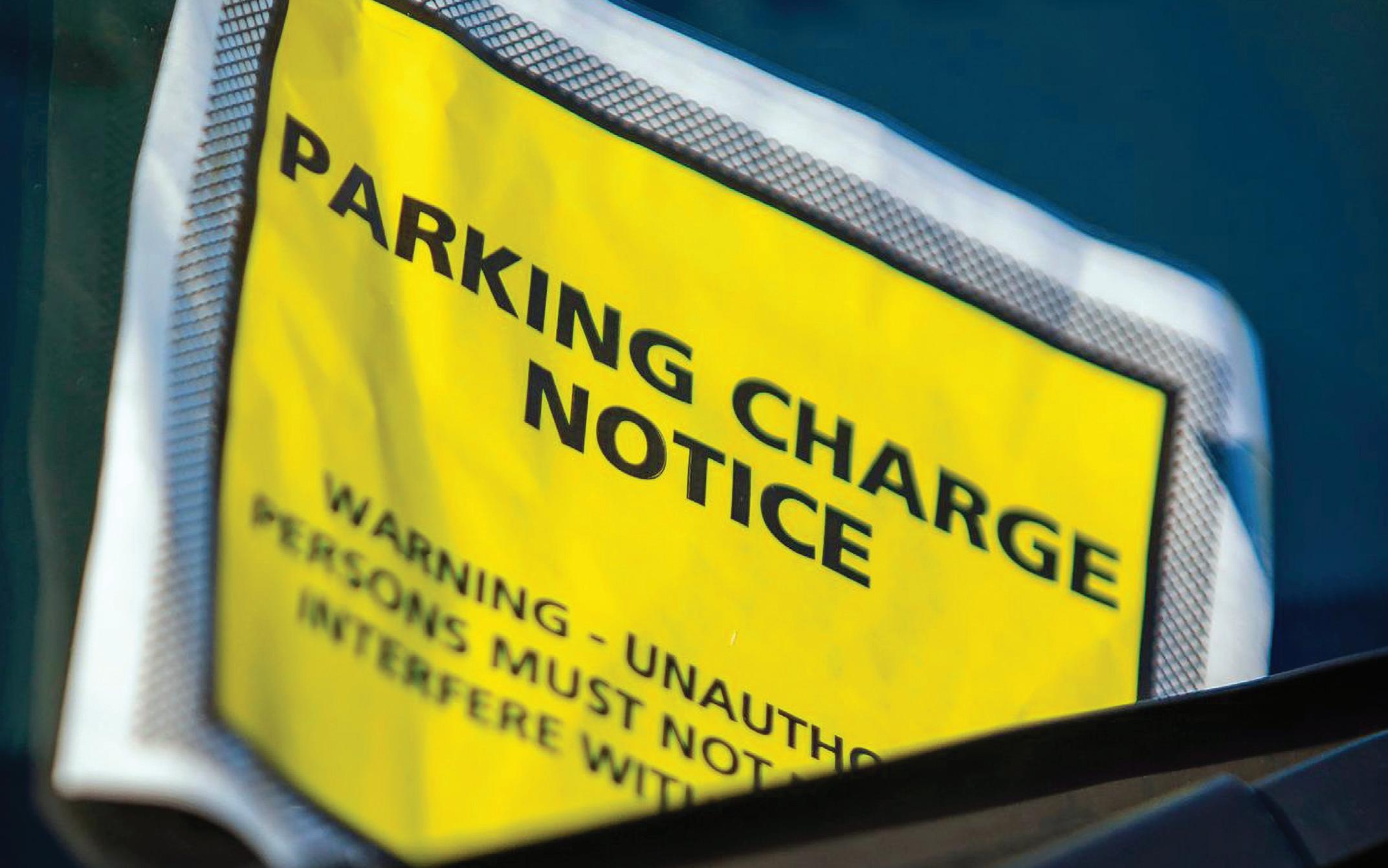
The UK’s two parking associations are to produce a single code of practice to be used across the entire private parking sector. The BPA (British Parking Association) and the IPC (International Parking Community) say their joint code is designed to raise standards while delivering greater transparency and consistency for the benefit of motorists.
The new single code introduces an ‘Appeals Charter’ that creates what the associations feel are clear and unvarying parameters for motorists to appeal against a parking charge.
The joint code mandates a 10-minute grace period for motorists, sets out consistent rules for operators and requires clear signage to help motorists navigate parking on private land.
The new code also ensures the protection of the most vulnerable in society, with no decrease to the deterrent for abuse of Blue Badge bays or those who choose to park selfishly, putting their own convenience above the needs or rights of others.
The new code will supersede the associations’ existing rules for parking companies that are members of their respective Approved Operator Schemes. Membership of these schemes enable the parking companies to access vehicle keeper data held by DVLA in order to issue parking charge notices (PCNs) to motorists who breach terms and conditions for using private land.
The Parking (Code of Practice) Bill was enacted on 15 March 2019, paving the way for the introduction of a single code of practice for car park management companies alongside the creation of an independent appeals service and scrutiny body.
In February 2022 the government first introduced but subsequently withdrew the Private Parking Code of Practice following a legal challenge by some parking operators.
The sector is still awaiting an updated version of the Private Parking Code of Practice from government. In the meantime, the associations have united to ensure the key elements of the government’s code are implemented as soon as they can be.
The new code will be published in June 2024. It will introduce:
• a mandated 10-minute grace period for motorists
• consistent signage standards
• a single set of rules for all parking operators on private land
• an appeals charter for those who receive parking charge with mitigating circumstances.
The code is due to be implemented on 1 October 2024, with existing sites expected to bring their signage up to requirements, and be within full compliance by late 2026.
Andrew Pester, chief executive of the BPA, said: “We are delighted to introduce a single code of practice across the private parking sector. This is a crucial milestone as we work closely with government, consumer bodies and others to deliver fairer and more consistent parking standards for motorists. We will continue to push for a positive outcome for all.”
Will Hurley, chief executive officer of the IPC, added: “This is a long-awaited day, the sector has been calling for a single code of practice for a long time and we are proud to be committing to it. The single code will benefit all compliant motorists and will present clear consequences for those who decide to break the rules. The sector has listened to the motoring community and today we are acting.”
The British Parking Association and the International Parking Community have committed to continue to work together to achieve the following:
• update and maintain the code
• provide guidance on the code interpretation
• maintain a consistent sanction scheme
• create more consistent second stage appeals process.
An oversight group will ensure that interpretation of the code is consistent and to give guidance and update the code where necessary.
The official code is coming...
The Department for Levelling Up, Housing & Communities (DLUHC) welcomed the parking sector’s plans to publish a new code, but appears to regard this as an interim measure.
A spokesperson told Parking Review: “We are pleased to see the industry has recognised the unfairness of the current private parking system and the need for change by introducing this single industry code. Whilst this is a positive step forward, it is only through the introduction of our Private Parking Code of Practice that we will strengthen the existing system of regulation.
The government says that its code is still being reviewed. The DLUHC spokesperson said: “We have had to revisit the decisions in the code relating to parking charge caps and debt recovery fees, involving conducting a Call for Evidence and carrying out another public consultation before final decisions can be taken. The government is committed to working with industry and consumer groups to see the new government Private Parking Code of Practice reintroduced as soon as possible.”
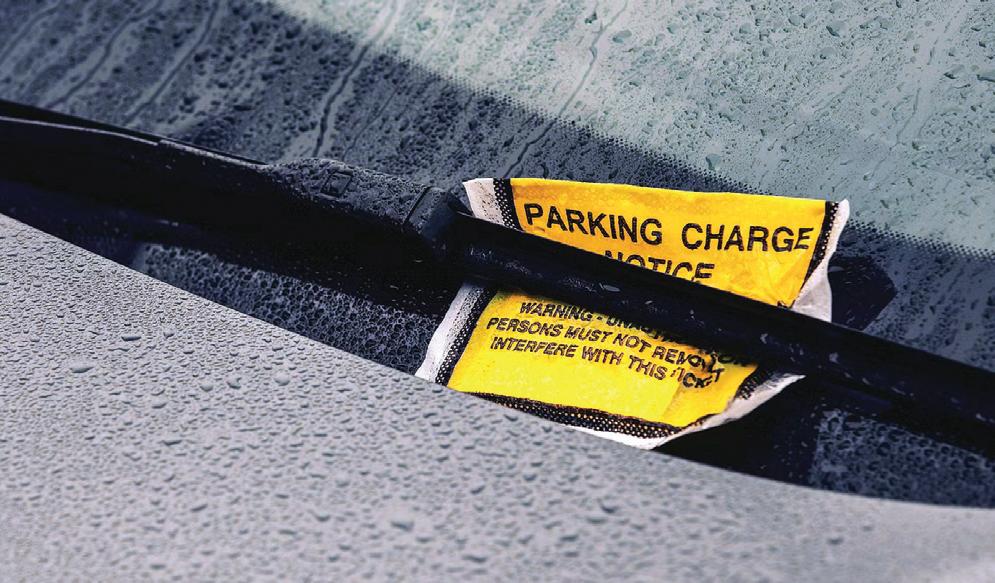
The RAC has expressed scepticism about the unified code of conduct published by the British Parking Association and International Parking Community. The motoring body has long called on the government and MPs to act after being contacted by drivers who felt the actions of private parking companies were unreasonable. In 2017, Sir Greg Knight MP introduced the Parking (Code of Practice) Bill which received Royal Assent in 2019 with cross-party backing and government support, but the government’s official code remains in development.
Following the announcement by the private parking industry that it is to introduce its own ‘code of conduct’, RAC head of policy Simon Williams said: “We’re flabbergasted that the BPA and IPC have suddenly announced plans to introduce their own ‘private parking code’ after doing all they can over the last five years to prevent the official ‘Government Code’ created by an Act of Parliament coming into force.
“While there are clearly some positive elements to what the private parking industry is proposing, it conveniently avoids some of the biggest issues around caps on penalty charges and debt recovery fees which badly need to be addressed to prevent drivers being taken advantage of. These elements, alongside a formal appeals process, are currently being worked on by the government and in our opinion can’t come soon enough.
“Nothing should stand in the way of the official code, least of all a new industry scheme which muddies the waters and risks confusing drivers. For the private parking industry to all of a sudden paint themselves as being whiter than white with their own ‘code’ and appeals charter takes irony to another level.”
‘No action after five years’ RAC Foundation calls for ministers to act on parking

Five years on from the introduction of a law to help protect drivers when they park on private land and still none of the provisions have been introduced, says the RAC Foundation. On 15 March 2019, the Parking (Code of Practice) Bill championed by Sir Greg Knight MP was enacted, paving the way for the introduction of a single code of practice for the management of parking on private land. The government’s new code is intended to supersede self-regulation by the sector’s two trade bodies – the British Parking Association and the International Parking Community – which have just agreed a joint code of practice for their members.
The government’s Private Parking Code of Practice was originally laid before Parliament in February 2022 and was due to come into force across Britain by the end of 2023. It inclusded measures such as: halving the cap on tickets for most parking offences to £50; creating a fairer appeals system; higher standards for signage; and banning the use of aggressive language on tickets. But the code was withdrawn by the government in June 2022 following a legal challenge by parking companies and it has not been reintroduced.
A new Call for Evidence run by the Department for Levelling Up, Housing and Communities (DLUHC) closed on 8 October last year.
The RAC Foundation is concerned that parking firms are continuing to issue an ever growing number of parking charge notices (PCNs) to drivers accused of parking infringements on private land. An average of more than 35,000 parking tickets are being issued every day, estimates the motoring research body.
The foundation has conducted analysis of official data that shows that at least 9.7 million tickets were issued to drivers by private parking companies in Britain between April and December last year. This estimate is based on the number of vehicle keeper requests parking firms make to the DVLA. The number of vehicle keeper requests is used as a proxy for the number of tickets being handed out to drivers supposedly breaking parking regulations in places such as shopping centres, leisure facilities and motorway service areas. At the current rate, the RAC Foundation calculates that at least 12.93 million tickets could be issued in the year to the end of March, up from 11.05 million in the previous 12 months.
Some 185 parking management businesses requested vehicle keeper records between April and December in 2023. The DVLA charges private companies £2.50 per record. The firms use information received from DVLA to send vehicle keepers parking charge notices (PCNs) for up £100 a time.
Private parking businesses have been accused of using misleading and confusing signs, aggressive debt collection and unreasonable fees, says the RAC Foundation.
Steve Gooding, director of the RAC Foundation, said: “Since March 2019 many things have happened. The five years have seen us through four prime ministers, a pandemic, and a cost-of-living crisis. But what we’ve not seen is the implementation of the protections MPs were queuing up to support when the Parking (Code of Practice) Act made its way onto the statute book all those years ago. Ministers would do well to consider how their performance looks to the many millions of drivers who’ve been issued with a ticket since the law was enacted. What’s needed is a swift dose of hurry-up treatment in this election year if those voters are not to be left feeling badly let down.”
Health minister says legal issues around ANPR need addressing
The introduction of free hospital car parking in Northern Ireland has to be delayed in part due to legal challenges affecting plans to use automatic number plate recognition (ANPR) technology, health minister Robin Swann has said.
The Hospital Parking Charges Act (Northern Ireland) 2022, which bans the imposition of parking charges in hospital car parks, was due to come into effect in May 2024.
However, Swann asked the Members of the Legislative Assembly (MLAs) to approve a two-year delay to the Hospital Parking Charges Bill coming into effect due to logistical and budgetary issues which make the planned starting date unfeasible.
His intervention reflects practical obstacles with the planned introduction date as well as deepening budgetary pressures on health.

While the total removal of all charges would be deferred, car parking permits for eligible staff would be provided free of charge across the two year period.
In a statement, Swann said:
“Health and social care trusts have advised that the infrastructure required to manage free parking cannot be in place in
time. This is due to legal challenges delaying a contract for automatic number plate recognition technology.
“As a result, the intended traffic management solution will not be operational by 12th May. In its absence, trusts would have significant concerns about their ability to maintain safe access
HM Revenues & Customs has lost a case against an NHS foundation trust at the Court of Appeal, which ruled that car parking income should not be treated as standard rated for VAT. Northumbria Healthcare NHS Foundation Trust challenged HMRC’s view that VAT is chargeable at the standard rate for charges levied for car parking at sites operated by the NHS.
On 27 February, the Court of Appeal decided the trust was not acting as a taxable person when it operated car parks at hospitals and other healthcare facilities. It ordered HMRC to pay back £267,443 in VAT to the trust. This ruling could have ramifications for 50 similar appeals by NHS trusts and overturns two previous rulings.
The case at the Court of Appeal was brought by Northumbria Healthcare NHS Foundation Trust after failing at the First Tier Tribunal (FTT) and Upper Tribunal.
The trust argued that it was exempt from paying VAT according to the Principal VAT Directive (PVD) and the Value Added Tax Act 1994 (VATA).
The first appeal was brought in 2017 and related to three years of HMRC charging the trust VAT at the standard rate of 20% on its car parking fees from 2013 to 2016. The outcome of the case is only relevant when the trust itself is operating the car park, and not outsourcing the management of the car park to a third party.

The trust operates 14 hospitals and provides pay & display car parking at up to £6 for 24 hours, which generates additional income to “better carry on its principal purpose”.
Over the three years, Northumbria Foundation Healthcare Trust believed it should be owed £267,443 in VAT. With hospitals making £146m in patient and visitor parking in 2022-23, if the 50 other trusts with claims follow suit in this case, the total VAT refund is likely to reach up to £70m.
The case at the Court of Appeal revolved around three grounds. Ground one stated: “The Upper Tribunal erred in concluding that the Trust did not supply car parking under a special legal regime”.
Secondly, the trust said HMRC failed to “correct the FTT’s application of an incorrect test for determining whether there was a distortion of competition; and
to their sites for patients, clients, visitors and staff. Preserving blue light routes would be a particular concern.
“In addition, it is unfortunately the case that the financial position for our health service has deteriorated in the past two years. A blanket removal of all charges would result in loss of income, resulting in £10m in costs per year in total to control access and maintain car parks.
“My primary concern as minister is to protect access to hospitals for legitimate users. Free parking without traffic management could very quickly lead to a free for all, with serious consequences for traffic not just in hospital sites but in surrounding areas.
“It is widely agreed that the current budgetary situation will require difficult decisions by the executive and assembly. Deferring the introduction of free hospital parking certainly falls into that category.”
The MLAs agreed to the extension in a debate held at Stormont on 7 May.
a significant distortion of competition”.
Ground three of the appeal saw the trust state that: “The Upper Tribunal erred in concluding that there was sufficient evidence to entitle the FTT to conclude that HMRC had discharged the burden of proof on the distortion of competition issue.”
HMRC argued that trust car parks were not public authorities, which are usually not taxable for VAT purposes. It also did not recognise that the trust was a body governed under public law. The court ruled against this and remade the decision of the lower tribunals.
The appeal judges, Lady Justice Asplin, Lord Justice Green and Lady Justice Falk, said that the hospital car parks were provided by the trust and therefore a public authority, and that “HMRC has not demonstrated that non-taxation would lead to significant distortions of competition”.
HMRC said it was continuing to engage with NHS bodies to discuss the effects of the hearing but believes that applying tax should be done consistently.
A HMRC spokesperson said: “The tax rules apply to everyone and we discharge our responsibility across all sectors fairly and evenly. We are considering the judgement.”
The Court of Appeal allowed the appeal from Northumbria Healthcare NHS Foundation Trust, setting aside the decisions at both tribunals, meaning HMRC has to repay the VAT from the three years in question.
NHS Grampian seeks permission to let employees use car park
NHS Grampian has submitted a planning application to allow staff to use a car park which was built exclusively for patients and visitors.
The Lady Helen Parking Centre at Aberdeen Royal Infirmary opened in February 2018. It was funded by the Wood Foundation. The charity, set up by oil tycoon Sir Ian Wood, said it supported the change of conditions to allow staff parking.
Staff have been able to park on certain floors of the 1,100space multi-storey since the pandemic, but this arrangement change is set to come to an end.
The health board says the availability of car parking was one of the most contentious issues it faces. The board has thus applied to Aberdeen City Council for the permission to allow staff to park on levels 6 and above permanently, while ensuring patients and visitors

are prioritised.
NHS Grampian also wants to introduce an automatic number plate recognition (ANPR) system alongside parking patrols in order to deter unauthorised vehicles parking on site.
Alison MacLachlan, UK director of the Wood Foundation, said its investment was designed


to ensure there was adequate parking for patients and visitors to the Foresterhill campus: “NHS Grampian has assured us that continuing to allow staff access to the upper floors of the car park will not jeopardise this position. The team will continue to monitor parking levels to ensure this remains the case.”
Oxford University Hospitals (OUH) NHS Foundation Trust earned about £2.5m from patient parking charges during 2023, up from £1.5m the year before, according to NHS England figures.
The trust says all money raised by parking fees was reinvested in services.
August 2023 saw visitor car parking tariffs change for the first time since 2017, according to the trust. It costs £15 to park for over 6 hours. It was previously £7.
Prices at John Radcliffe Hospital, Churchill Hospital and Nuffield Orthopaedic Centre were increased for those staying longer, but reduced for short visits.
Charges at the trust’s fourth site, Horton General Hospital in Banbury, remained the same because they were similar to nearby public car parks.
Mark Holloway, OUH chief estates and facilities officer said free and concessionary parking are available for people with disabilities, people on low income and regular attenders.



Sustainable and shared travel facility will serve local shopping street
A mobility hub is to be installed at a shopping precinct in Derby this summer, giving residents better sustainable transport options and reduced congestion and air pollution.
The Nottingham Road mobility hub will provide the local community with a range of sustainable and travel methods, making it easier for local residents to access the precinct as well as access additional transport choices.
Alongside the improved travel options, there will be new seating areas and planters.
Cllr Carmel Swan, climate change, transport and sustainability, said: “I’m delighted that the latest mobility hub will be in place this summer, following the success of our first hub in the Six Streets area of Darley.
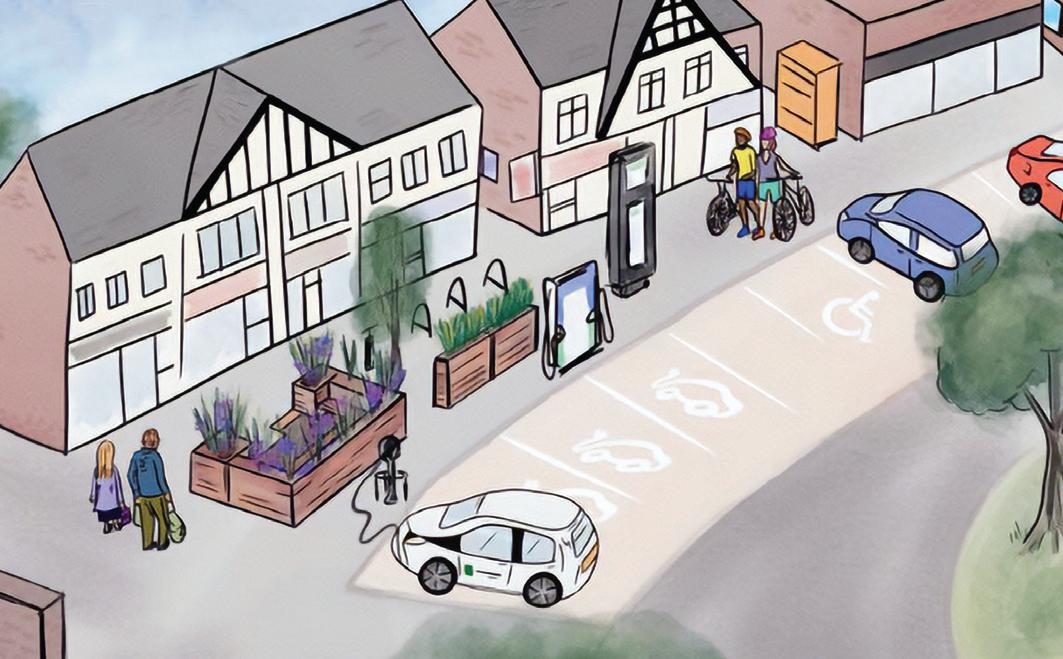
“Many of our improvement works so far have focussed on the city centre, but Derby is much more than this and it’s important that other areas of the city benefit from improved transport choices.
“This mobility hub will be a welcome addition to our evergrowing network of active and sustainable travel options and will play a key role in our com-
A pair of parklets have been introduced in Exeter to offer the public a pleasant space to sit and socialise in the city.
The parklet project aims to elevate the quality of the city’s streetscape and encourage community and business engagement. The city council says the parklets will contribute to creating vibrant, planted, seating areas and provide space for people to enjoy and foster community engagement. It is hoped that the repurposed parking spaces will enrich the public space experience for residents and visitors to the city.
The Exeter parklets are located on Fore Street and Musgrave Row.
Fore Street, known for its creative spirit, will benefit from a parklet that reflects the area’s identity and sustainability goals.
Musgrave Row, an underused area in the centre will be revitalised, contributing to a more vibrant and connected city centre.
The project aligns with key post-pandemic themes, including support for the local food and drink scene, the city’s Net Zero Carbon goals and initiatives promoting health,
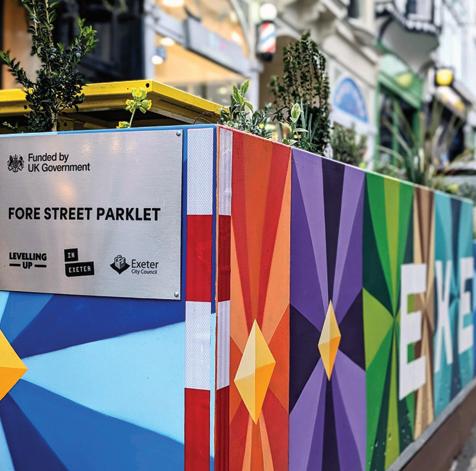
wellbeing, and public space.
Cllr Laura Wright, deputy leader of Exeter City Council and portfolio holder for culture and city centre strategy, said: “These two parklets are poised to make a significant impact on the city, representing a positive step in cultivating communal spaces. Serving as free, accessible hubs for relaxation and socialising, parklets encourage people to connect and spend extended periods in the city.”
The parklets have received £50,000 in funding from Exeter City Council through the government’s Shared Prosperity Fund, and are being commissioned by the area’s Business Improvement District, InExeter. The Shared Prosperity Fund is an initiative dedicated to improving public spaces and building pride in local places.
bined efforts to combat climate change through reduced pollution and congestion in Derby.”
The installation of the hub will allow the footway to be improved, as well as the addition of:
• An Enterprise car club location
• An accessible seating area with bike storage and a public bike pump
• Electric vehicle (EV) charging
• Interactive screen with live travel updates.
Installation of the mobility hub will not reduce the number of conventional vehicle parking spaces but will give residents more options.
The work is due to start in Summer 2024 with the work taking just a few weeks to complete.
The mobility hub will be funded by the Department for Transport’s Future Transport Zones Fund, which was awarded to Derby City Council to trial new and exciting developments in transport.
Derby City Council has joined forces with Enterprise Car Club to bring an accessible public car club to the city. The car club will enable citizens to get around using electric and low emission vehicles. Once a member, users will be able to hire car club vehicles from six on-street locations.
Nottingham City Council is installing 275 racks for e-bikes and e-scooters to help improve parking. The scooters are being funded by the Transforming Cities fund.
So far 140 racks have been installed and the rest will be introduced by June. Locations for the racks have been prioritised for areas where:
• there is high usage of the e-bikes and e-scooters
• the current parking arrangements are not working and there is anti-social behaviour
• there are good connections with the local transport network.
Users are required to park the e-bikes and e-scooters at several designated parking bays around the city. People can report e-bike parking issues by contacting Lime.
Lime e-bikes were launched a year ago in April 2023 and so far more than 130,000 rides have been made across the city. The e-bikes cost £1 to unlock and then 17p per minute to ride. If people would like to use the e-bikes for longer journeys, Lime offers ride passes such as 30 minutes for £2.99 or 60 minutes for £5.99.
The e-scooter trial is due to end in May 2026.


Kent drivers warned inconsiderate parking puts lives at risk
Canterbury City Council and Kent Fire and Rescue Service have joined forces with waste collectors to warn drivers about the dangerous consequences of irresponsible parking.
Crews at the council’s Canenco waste service will leave educational flyers on vehicles blocking road access in a bid to make people aware of the risks of their poor parking. The Getting Through campaign warns that if a fire engine fails to get down roads because of poor parking, the result could be devastating.
Danny Turner, group manager for service delivery at Kent Fire and Rescue Service (KFRS) said: “Poorly parked vehicles can delay our crews responding to a 999 call. We need a gap of at least 3.1 metres for a fire engine to pass, and a four-metre gap to be able to operate a fire engine at an incident, so we’d urge all drivers to think carefully about where they park to ensure any emergency vehicle can pass.
“We could be on our way to a life-threatening incident, so any delay caused by poor parking could have devastating consequences.”
The council is also highlighting how obstructively parked cars impede waste collection vehicles.

Canenco waste service crews face collection problems caused by parked vehicles blocking their access to roads across the district, resulting in whole streets missing their waste collections.
As many as 15 streets a day miss their waste collection due
to motorists parking their vehicles inconsiderately.
Cllr Charlotte Cornell, Canterbury City Council’s cabinet member for waste and recycling, said: “Having regular bin collections is important for all our residents and Canenco has been
Firefighters in Cheshire are urging drivers to stop risking lives by parking in front of fire stations. Cheshire Fire & Rescue Service has received a number of reports of cars causing potential obstructions to fire engines at their stations.
The service posted one image of a vehicle in the car park of Wilmslow Community Fire Station.
Posting on X (formerly Twitter), the service wrote: “Please refrain from doing this as it causes an obstruction and can delay our crews from responding to incidents.”
Tony Hughes, group manager for operational policy and planning, told the BBC: “We are receiving increased reports from firefighters that people are parking vehicles on or around stations, causing an obstruction.”
Cheshire Police is inviting residents to report illegal parking problems online via Operation Park Safe, a new website which will allow members of the public to report parking issues online.
The new website is set to be launched in Crewe in January.
People will be able to upload photos and videos to the police website and these will then be assessed and handled by traffic officers.
The police force said minor obstructions or issues would be allocated to a local police community support officer (PCSO) or beat officer to deal with. If the trial is successful, the programme could be rolled out across the county.
Sgt Russell Sime said: “We know that unsafe parking can cause a real nuisance and

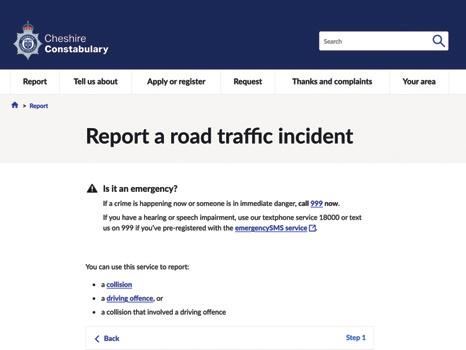
danger to members of the public. But we cannot be everywhere. This initiative relies on the help of active citizens to aid us in making the roads safer. However, it is important to note that while we will always try our best to resolve parking issues, there are some offences which do not come under our control. We hope residents will make use of this initiative so we can all work together to make our communities a safer place to live.”
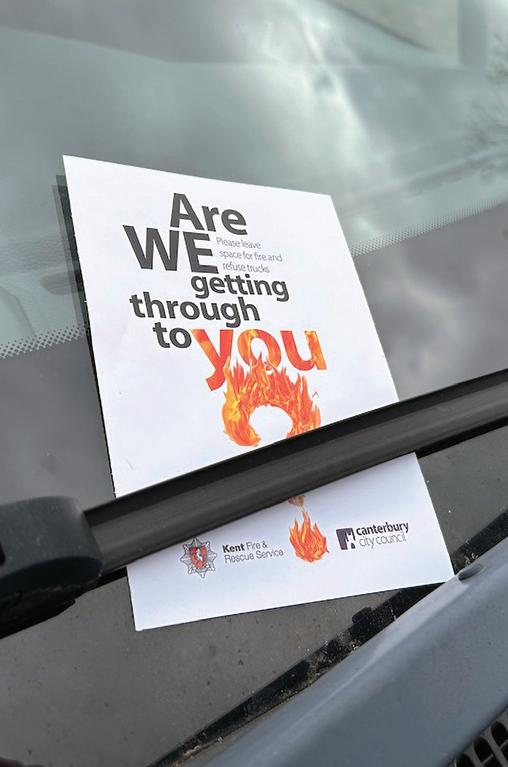
working really hard to improve the reliability of the service.
“But when irresponsible parking means our trucks can’t get through, there is the potential for whole streets to be missed, and residents then rightly feel very frustrated with the situation.
“Please check, and then double check, your parking to ensure that large vehicles can access streets for vital services.”
David Maidman, Canenco’s director, said: “Clearly uncollected household waste is just the tip of the iceberg when it comes to vehicle access problems. We understand it can be difficult to park while leaving sufficient space, particularly along some of the district’s narrow, winding streets, but it simply isn’t worth risking someone’s life over a minor inconvenience.”
Blue Badge Fraud Investigation (BBFI) has reported a notable increase in counterfeit French disabled Blue Badges appearing in London.
The specialist fraud investigation company said individuals are illicitly displaying permits which seem to have been produced in both China and the UK to unlawfully access parking spaces reserved for disabled people.
BBFI founder Paul Slowey said: “Our specialist team of investigators has been concerned to see this dramatic increase in fraudulent French Blue Badges across the capital, and is working tirelessly to combat this gross exploitation of a scheme that aims to help disabled people.
“The misuse of disabled parking permits has already
reached alarming levels in London, with these additional false permits exacerbating a problem that is depriving genuine disabled motorists of essential parking accommodations and undermining the integrity of the Blue Badge.
“The widespread use of counterfeit permits results in substantial financial losses because of evaded parking fees and penalty charge notices.”
BBFI is now calling on London local authorities to adopt a comprehensive approach to address this pressing issue to ensure disabled residents are not impacted and to reduce the monetary impact at a time of financial crisis for many local authorities throughout the UK.

Compleo chargers come with reliability built in. We achieve 99.7% uptime, so your chargers work e�ciently, giving your customers the power they need, when they need it.
We o昀er a complete EV charging solution, with a range of AC and DC chargers suitable for every environment along with powerful software to manage your network . What’s more, our API integration means our chargers work seamlessly with your existing payment systems and apps.
All of which means it is easier to generate revenue for your business, when you partner with Compleo.
Call 01235 355190 or visit compleocharging.co.uk/parking Or see us at Parkex, 22-23 May.

The power to move


Transport Technology Forum demonstrates how system works
The number of local authorities that have signed up to the National Parking Platform (NPP) scheme has passed 200.
The NPP is a Department for Transport-led initiative to simplify parking payment. The pilot platform enables payments using a range of established parking apps, rather than having to have a specific app for a specific area. The NPP also aims to offer benefits for local authorities, including providing data exchange to enable multi-seller payments, a way of sharing parking information and standardising technical and commercial relations.
The announcement was made at the Transport Technology Forum’s Annual Conference in Leicestershire.
Conference delegates were able to try the solution for themselves, signing up for a parking session using the same code – 909 007 – on any of six parking apps: APCOA Connect, AppyParking, Caura, JustPark, PayByPhone and RingGo.
TTF Smarter Parking Working Group chair Sarah Randall said: “The parking sector working in


a connected way to show a live demonstration of the National Parking Platform and wayfinding for the delegates shows the tech-
nology works and is ready for use by the general public. The overwhelmingly positive response to the concept from
A Suffolk council will look in detail at issues raised by a decision to revise its parking charges. Babergh District Council’s Cabinet will further discuss the decision to introduce modest short-term parking charges in Sudbury, Hadleigh and Lavenham after the decision was ‘called in’.
The cabinet agreed on 8 April to stop subsidising free parking after it was warned the authority is “on the edge of an economic precipice”.
Parking is currently free for three hours in Sudbury and Hadleigh, and all day in Lavenham, but with Babergh facing a £6.7m budget gap over the next four years, it can no longer afford to continue subsidising free parking without cutting other essential services.
New charges were agreed by cabinet included a £1 charge for short stay parking for the first hour, or £1 for two hours in long stay. These are below neighbouring authorities’ rates, with plans to introduce them before the end of the year. However, the decision was referred back to a meeting of the council’s overview and scrutiny committee.
Following a debate, the committee agreed unanimously that cabinet should look again, with particular focus on a

number of areas. These are to: ensure a one-hour free tariff option is fully considered; give further consideration to the local economic impact of the proposed changes; and consider the impact of the short-term charges on those facing poverty in rural areas and vulnerable residents.
Council officers will also meet with Great Cornard Parish Council prior to a cabinet meeting, and further consider previous recommendations made by the overview and scrutiny committee. The matter will be heard at a future cabinet meeting.
A number of measures had previously been agreed to limit the impact of the introduction of charges. The full-day charge for parking in Hadleigh and Sudbury was due to reduce from the current £3-a-day to
so many busy local authorities and parking highway professionals fills me with an expectation the NPP will be a great success.”
While using the NPP is not mandatory, a total of 207 local authorities have now chosen to join, connecting them to all participating apps at once, without the need for complex procurement. The concept is built to be future-proofed, by not being limited to parking, because it could also include EV charging, residents’ parking and kerbside management. It is also hoped to attract tourists by giving them an easier experience.
The then roads minister Richard Holden wrote to authorities last October to explain how they could benefit from the NPP by unlocking a wider range of services, get better data about their areas and automate routine functions, all without the need to procure.
Holden also wrote: “Parking apps get access to a wider market that we expect will grow to cover services beyond parking.” Holden also pointed out that: “Users get less frustration, more choice and an open marketplace where apps compete based on the quality of their service.”
npp.org.uk
£2.50 – supporting town centre workers, and encouraging visitors from further afield to spend the day exploring the high streets and local attractions.
Officers are also already looking at refund arrangements for users of the council’s leisure centres at Sudbury and Hadleigh so no one is deterred from staying fit and active, and also for customers to Roys in Sudbury. In addition, officers are exploring exemptions for users of nearby medical centres and mobile screening facilities, and possible meanstested permit schemes are being explored for parents using council car parks for the school drop-off and pick-up.
When announcing the new charges on 8 April, Cllr John Ward, acting council leader, told the meeting: “Babergh, like many other councils, has a well-publicised budget shortfall over the next few years, with the huge cost of our car parks being a considerable part of this. We cannot continue to carry this cost if we want to deliver essential and valued services for our residents and communities.
“We really only have three options –outsource the car parks to a commercial operator, which we have already ruled out, get the towns to take over the car parks which they do not want to do, or introduce the modest revisions to the tariffs.”


Rogue advertisers are hijacking promotions for parking apps as a way to trick drivers into setting up recurring payments. Drivers falling victim to fake parking apps which trick users into spending money on unwanted fees and subscription costs. An investigation by consumer champion Which? has found an increasing number of fake adverts for popular parking payment apps at the top of online search results, which trick drivers into giving their bank details to third-party websites. The fake websites impersonate popular parking payment apps by using similar wording and branding. The scam websites also claim to offer a ‘free download’ but the small print then commits the user to expensive monthly subscription fees.
Which? has issued several warnings about drivers being charged outrageous sums for unwanted subscriptions after searching for parking apps online, or accidentally giving their card details to random third-party websites instead of Transport for London to pay Ultra Low Emission Zone (ULEZ) charges. In some cases drovers are directed to the fake apps via false QR codes that have been physically posted over real ones on car park tariff signs or instructions on payment terminals. Or the scammers create a domain that emulates the genuine parking app to intercept people registering their vehicle online. Which? says scammers continue to find ways to abuse online advertising to trap drivers. It has seen adverts impersonating JustPark, PayByPhone and RingGo on Google – all of which appeared at the top of search results on a mobile phone and above the genuine websites for these companies.
It cites websites called onlytelephone.com and another called homeautomationinnovators.com that appeared to link to the same PayByPhone fake website. Both claimed to offer a ‘free download’ but hide identical small print at the bottom of their websites revealing charges of £24.99 a month to an unnamed company for a ‘health and lifestyle bundle subscription’.
A spokesperson for PayByPhone confirmed to Which? that these advertisers have nothing to do with PayByPhone and did not have permission to use its logos. It added that it has previously reported fake adverts but scammers simply buy a new domain. Which? attempted to contact both advertisers using the email addresses listed on their websites. The message to onlytelephone.com bounced back and it received no response from homeautomationinnovators.com.
adverts targeting drivers on Google
Drivers are being urged by Which? to only use official Apple or Google Play app stores and avoid online search engines, like Google, Yahoo and Bing, when attempting to download parking apps. The research from Which? has found that there were a higher number of fake adverts on Google compared to its competitors. In response, Google said it removes adverts that violate its policies and that under its misrepresentation policy, it doesn’t allow ads that deceive users by excluding relevant product information or providing misleading information.
Google and the other search engines, along with social media giant Meta, will be legally obliged to remove scams and other harmful content under the new Online Safety Act. However, Which? says a challenge for genuine parking app companies is the sheer volume of fake websites, with scammers launching new sites within weeks of the fraudulent ones being removed.
Which? discovered that the same scammers were able to abuse Google’s advertising platform even after it had reported them. Which? first warned Google about an advertiser impersonating RingGo on 15 November 2023. It was told Google had “taken action” yet found the same website impersonating RingGo as well as other parking apps almost three weeks later.
Back in August 2023, Which? shared its concerns about a Google advertiser called uk.apkpac, and again was told action had been taken, but this website was still appearing at the top of Google search results for parking apps on 5 December.
Which? found far more examples of dodgy parking adverts on Google than other search engines, but rogue advertising is
everywhere. In fact, the consumer body appeared to find the same advert on both Yahoo and Microsoft’s Bing, this time linking to a website called trendy-apps.com. As before, this advertiser is using the PayByPhone logo and setting up unwanted subscriptions costing £24.99 per month with no clarity about who you’re paying. Which? attempted to contact trendyapps.com using the email address listed on its website but this message bounced back. A spokesperson for Yahoo Search ads said it has a partnership with Microsoft Bing and has worked with them to block this advertiser.
Who bears responsibility for fake adverts?
Following a successful campaign led by Which?, online platforms such as Bing, Google and Meta will be legally obliged to remove scams and other harmful content under the new Online Safety Act. Which? says that Ofcom must now develop codes of practice that will hold platforms to a high standard and be prepared to take strong enforcement action, including fines, if they break the law.
What if I’ve given my card details away?
If you think you’ve added your card details on a scam website, contact your bank immediately. Keep an eye on your bank statements in case scammers have set up recurring payments. Your card provider can block further payments and issue a refund if you’re unable to get your money back.
Take your case to the Financial Ombudsman Service if your bank refuses to reimburse you. You should also report scams to Action Fraud (if you’re in England or Wales) or Police Scotland (if you’re in Scotland) by calling 101.
If people searching for a parking app on Google come across a fake advert, Which? advises that they can report it to the Advertising Standards Authority (ASA).

Motorists are being urged to do their research on ‘meet & greet’ parking companies offering services at London Gatwick before handing over their keys before jetting off on their travels. The airport has advised customers to look for accreditation from bodies such as the British Parking Association or trading standards. The airport said there had been a 250% increase in complaints about ‘meet & greet’ firms this year. While most companies are reputable and offer a good service as advertised, Sussex Police and West Sussex Trading Standards say they receive regular reports of customers who are disappointed with the service offered.
In previous years some customers have reported damage to vehicles, including with vehicles being returned dirty or with more mileage on the clock. Customers have reported some rogue companies purporting to take a vehicle to a secure car park, only for the company to leave the vehicle on a different level at the shortstay car parks without payment, leaving customers facing charges or a large bill upon their return. There have also been reports of very long delays from customers waiting for their cars to be returned to them after their holiday or trip.
As airports begin to get busier, Gatwick says it is important for motorists to check the reputation of the companies they are using. Motorists are being advised to remember that not all companies listed are affiliated to London Gatwick, even if the business includes ‘Gatwick Airport’ in its name or if their website looks like it is linked to the airport.

Fake parking tickets threatening drivers with bogus £70 fines have been left on vehicles in a South Wales town.
Bridgend County Borough Council is unsure whether the false penalty notices are being left to prevent motorists parking in the street or as a practical joke.
The fake tickets feature a local authority letterhead and came in yellow plastic bags with “penalty infringement notice” stamped on the outside.
The council has asked anyone who gets a notice that looks like it has errors to get in touch. It said: “Often, fake notices contain spelling mistakes and may not include information such as the specific charge for example.
“Whether the fake ticket has been created to prevent people from using a particular parking space or used as a practical joke it could still be construed as attempted fraud and could have very serious consequences.”
Bridgend Council shared a photograph of a fake parking notice, which states: “The warning serves as an official notice regarding the break of parking regulations. Please take immediate action to familiarize [sic] yourself with and adhere to the parking regulations within our community.”
The fake ticket does not ask for payment but warns: “Failure to comply with parking regulations may result in fines up to £70 or further enforcement action.”
Gatwick Police Neighbourhood Policing Team Inspector James Biggs said: “Travellers seeking to use ‘meet and greet’ parking services should do their homework before deciding which company to use. Online tools are available to help travellers with their research. If you book through an agent online, you should be aware that your vehicle may be allocated to a number of companies on their books. By doing research you will be more confident to leave your vehicle with your chosen company and enjoy your travels.”
Oli Bedford, head of parking at London Gatwick, said: “We have no relationship with these rogue ‘meet and greet’ parking companies, even though many of them have ‘Gatwick’ in their company name. Legally rogue firms can operate on the airport as long as they do not break our by-laws. If passengers are considering using an off-airport meet and greet parking provider, they should check that they have a good reputation on Trustpilot, Trip Advisor or any other reliable means. The British Parking Association also has some good advice. For complete piece of mind, I would strongly recommend that passengers use official on-airport parking.”
Richard Sargeant, West Sussex Trading Standards team manager, said: “In recent years, we have had to deal with a number of rogue ‘meet & greet’ companies at the airport and it can be very difficult for travellers to decide which parking operator is best to use when you go on holiday or business. We would recommend travellers either park with Gatwick Airport direct or use a Trading Standards Approved business, who are reputable businesses. They afford you far greater security while you are away and so we always suggest visiting www.buywithconfidence.co.uk to find out which meet and greet operators have been Trading Standards Approved.”

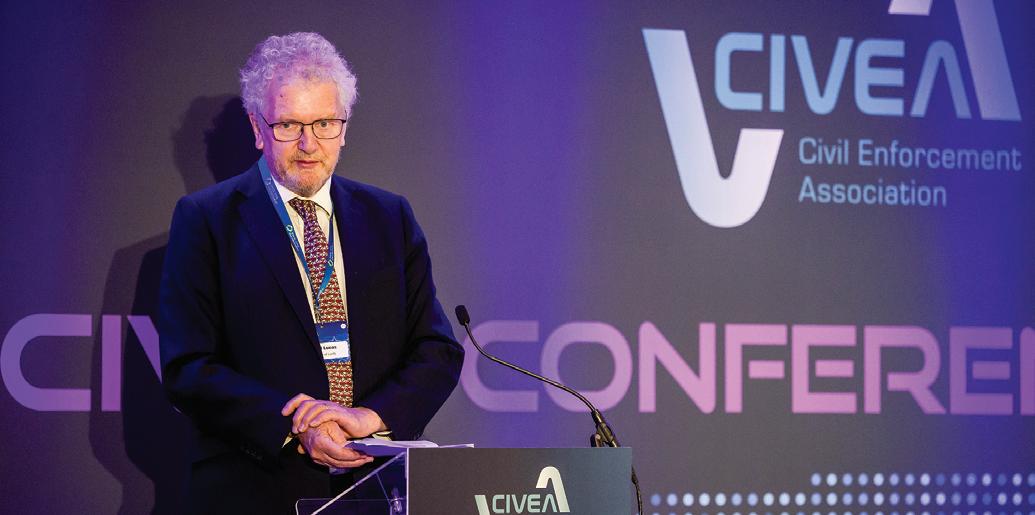
Russell
shares key discussions from the CIVEA Conference 2024
The ways in which the civil enforcement sector is working to ensure debts are collected in a responsible manner were a key talking point at a major conference held in London last month. The Civil Enforcement Association (CIVEA) returned to the De Vere Grand Connaught Rooms for a conference, exhibition and gala awards dinner. The conference brought together the enforcement industry, local government, the technology sector, civil service and debt charities to debate issues and share ideas on how, with increased demand for the highest standards, the industry can continue to support central and local government clients.
The theme of the conference was ‘Defining Modern Enforcement’, which signalled the need for debate on how the industry defines itself in the wake of the pandemic and what is required to meet the challenges faced by the public sector. It has been ten years since The Taking Control of Goods Regulations came into force, so the conference was also an opportunity to review the impact of the regulations and for the sector to ask itself what a future enforcement sector will look like. Topical debates ranged from operational challenges such as responsible collections and smart enforcement to policy challenges, including independent oversight and sustaining a high calibre workforce.
The day began with a message from Lord Bellamy, the justice minister, who thanked the industry delegates for their important work. Lord Bellamy spoke of his desire for fair treatment of people with debt and his support for the innovative use of technology. He was grateful for the industry’s proactivity in supporting the Enforcement Conduct Board (ECB).
The keynote speech was delivered by Lord Lucas, chair of the Enforcement Law Review Group, who confessed to being a convert to the industry having previously been critical. He spoke of the reform programme that has led to collaboration on an independent oversight body and its importance for the evolution of our sector.
Panel 1: The impact of technology on collections and vulnerability
The morning panel sessions focussed on the use of technology. The first session highlighted the development of technology solutions that has become integral to modern enforcement.


• Chair: Carole Kenney, director, welfare, road traffic and road user charging, CDER Group
• Nick Rowe, IRRV president and assistant director, revenues and payments, Ealing Borough Council
• Darren Kelk, managing director, Ascendant Solutions
• Vanessa Northam, head of charity development, StepChange
• Darren Smith, head of transformation, Liberata
Panel 2: Data is the key to unlock smart enforcement
The panel discussed how data is being used in modern enforcement and predicted how it will support enforcement action in the future.
• Chair: John Mason, managing director, TRACE Group
• Dan Pearce, director of business development, TelSolutions
• Justin Hanna, head of direct sales, Acquired
• Richard Hanby, technical director, Ascendant Solutions
Panel 3: Preparing for Independent supervision
After lunch the focus turned to industry supervision and the challenges of professionalising our industry. CIVEA’s new president, Sarah Naylor, led a panel that considered best practice from other sectors.
• Chair: Sarah Naylor, sales director, Dukes Bailiffs
• Chris Nichols, chief executive, Enforcement Conduct Board
• Caroline Wells, founder of Different Petal and CIVEA CARE Panel member
• Joseph Surtees, head of standards and continuous improvement, Government Debt Management Function, HM Treasury
• Anna Roughley, head of insight and engagement, Lending Standards Board
Panel 4: Beyond the ECB: Professionalising our sector
The final session was an in-depth discussion on the challenges for an enforcement industry seeking recognition as a skilled profession. Topics included diversity in the workforce, staff welfare and training.
• Chair: Amy Collins, managing director, Rundles
• Sue Chapple, chief executive, Chartered Institute of Credit Management
• Deven Ghelani, director of Policy in Practice
• Muna Yassin, chief executive, Rooted Finance
Russell Hamblin-Boone is CEO of CIVEA www.civea.co.uk




The Civil Enforcement Association’s industry awards showcase the best practices in the enforcement sector and spotlight exceptional performance. The judges were keen to reward forward thinking, market-leading visions, or superior service standards that enhance the civil enforcement profession.
As an industry that operates discreetly under the radar, the Excellence Awards are an opportunity to embrace excellence and professionalism in the industry and celebrate success.
The event was hosted by Zoe Lyons, an award-winning comedian and a regular guest on TV and radio panel shows.
Women in Enforcement
New to the awards programme, this was an open category for women working in the industry or related private or public sectors, who have made a significant contribution to enhance the role of women in the civil enforcement sector. This may be a contribution over a period of time or a recent new initiative. The judges were looking to award an individual who merits specific recognition. There were five high calibre finalists.
Winner: Carole Kenney, CDER Group
Outstanding Enforcement Agent
Recognising exceptional individual performance in the field
The judges were looking to recognise an enforcement agent who merits specific recognition.
Winner: Andrew McGregor, Hambury Tilmond
Innovation in Enforcement
The judges were looking to reward innovation that drives up industry standards, particularly where this involves the use of technology.
• Winner (larger business): Dukes Bailiffs (Chat Bot)
• Winner (small business): JTR Collections (with Acquired)
Local Authority Partnership
Celebrating a community partnership with a local authority
A partnership with a local authority that leads to outstanding service and results, particularly using technology.
Winner: Rundle & Co
Best Vulnerable Support Initiative
Acknowledging excellence in sustained welfare support for an individual or individuals
The judges rewarded an initiative that demonstrates a strong understanding of vulnerability and is an exceptional response to support an individual or individuals.
• Winner (larger business): Equita
• Winner (small business): Hambury Tilmond
Training & Development
Demonstrating a successful and transformative training initiative
The judges awarded examples of training and development that have enhanced the performance of an organisation and promotes best practice.
Winner: CDER Group
JustPark CEO Eskinazi to become president of ParkHub, UK
JustPark has announced the promotion of Mary Corrie to managing director of JustPark, UK. In this new role, Corrie will be responsible for overseeing the day-to-day operations of the UK business, following the company’s recent merger with ParkHub, a North American provider of parking management software and payment solutions.
Previously serving as chief financial officer, Corrie was instrumental in orchestrating the merger alongside JustPark founder and chief executive Anthony Eskinazi.

keep delivering outstanding solutions that meet the needs of drivers and businesses alike.”
JustPark was established in 2006 to market and monetise both unused driveways and car park capacity, benefitting drivers and creating revenue for space owners. JustPark now has 13 million drivers and offers more than 250,000 spaces, including 50,000 residential spaces as well as those belonging to councils and parking companies.
Corrie joined JustPark in 2021 when the business was grappling with pandemic-induced revenue losses. Her financial background, including roles at Golar, Centrica and Direct Energy, has helped the company navigate this challenging period and steered it to a position resulting in significant recent returns for investors, including the UK Government’s Future Fund and over 10,000 retail investors.
Corrie said: “It’s a privilege to lead JustPark UK in this excit-

Living Streets has appointed Catherine Woodhead as its new chief executive.
She is currently head of Muscular Dystrophy UK, which she joined in 2016 as director of development before becoming chief executive in 2018.
The appointment comes after Living Streets’ current chief executive, Stephen Edwards, announced that he was stepping down in January after three years in post. He will finish at Living Streets on 26 April to take up a new role
within external relations at the consumer group Which? Woodhead will take over at Living Streets in August 2024, with Stephen Jefford acting as interim chief executive.
Dame Jane Roberts, chair of Living Streets, said: “Building on the success of our outgoing chief executive, this is an outstanding opportunity for Catherine to work with our committed staff and my fellow trustees to develop and deliver our new strategy in the run up to our centenary in 2029, and beyond.”
ing new chapter. I’m committed to building on our strong foundation to continue transforming parking across the UK, while driving growth and innovation. With our exceptional team, we’ll
Anthony Eskinazi said: “Mary’s expertise and leadership have been crucial in shaping JustPark’s strategic vision. She keeps us organised and focussed, which has played a significant role in our recent achievements. In this new era of growth, she has repeatedly proven that she is the best person to lead the business in achieving our ambitious goals for 2024 and beyond.”
Eskinazi will now focus on launching JustPark in North America and assume a strategic global role as UK president at ParkHub.
West London Business has announced that Kim Challis, regional managing director of APCOA UK & Ireland, will be taking up the role of chair of the West London Corporate Leaders’ Action Group (CLAG).
Challis will be taking the helm from 1 June 2024. She succeeds former Heathrow chief executive John HollandKaye.
CLAG was created in June 2021 to formulate business-led actions to respond to the significant economic contraction West London faced as a result of the pandemic, aligning with and complementing the work driven by local authorities in the West London Alliance (WLA) and other partners across the sub-region.
The initiative, which was launched in March 2022 at the Capital West London Growth Summit, is coordinated by West London Business (WLB) and supported by the West London Alliance. The group focusses on four workstreams: recruitment and skills; place and identity; net zero and infrastructure; and innovation

and growth.
Kim Challis said: “I look forward to meeting with other corporate WLB members engaged in the work of the West London Corporate Leaders’ Action Group to tackle the challenges we face within the area, and devise the actions we can take together to drive improvement for those in our local communities.”
Shanker Patel, chair, West London Business, added: “Kim has taken an active approach to social value in APCOA UK, leading their work to increase opportunities to develop women and young talent by thinking differently about how the company recruits and markets itself.”
New legal services business will work for private parking clients
APN Group, a debt-resolution firm founded in 2023, has announced the launch of Moorside Legal to service the private parking industry.
Through the creation of Moorside Legal, APN Group is able to support clients from prelitigation through to enforcement, operating pre-legal recoveries, claims, contentious case management, and enforcement processes to suit the client’s requirements.
APN Group’s chief executive Mike Marrs said: “It’s a phenomenal achievement to have built a legal services firm from the ground up, particularly in our sector. APN Group’s board knew that this was the right way to deliver the business our clients want, and our customers need.
“It’s been a hard slog, but we were able to do it because we had exactly the right people for the job. I’m glad we’re now able

to announce it to the world, and crack on with delivering truly unified debt recovery to the private parking world.”
Moorside Legal was created by debt industry and litigation experts, including Eddie Harrison, APN’s chief operating officer, and Adam Peacock, Moorside Legal’s managing director. Harrison and Peacock previously worked together at
The Enforcement Conduct Board (ECB) has commissioned research to give it a clearer picture of the doorstep practices of enforcement agents.
The ECB is the independent oversight body responsible for overseeing the enforcement industry. It aims to enhance industry standards and ensure those experiencing enforcement action are fairly treated.
The board feels there is a pressing need for high quality evidence on the realities of enforcement for those who have experienced it. The ECB has thus appointed social research agency MEL to lead an evidence gathering research project.
Fieldwork for the project will start in the Spring and will involve a review of randomly selected body worn video (BWV) footage taken during enforcement visits.
The footage will be assessed against rigorous criteria developed in partnership with experts across the debt advice sector and
enforcement industry on key areas such as failing to respond to vulnerability or misrepresentation of powers.
A full report will be published in the Summer. The ECB will use the outcomes to inform the development and implementation of its oversight regime.
ECB chief executive Chris Nichols said: “We are delighted to have appointed MEL to lead this exciting research project. Building up a reliable and objective evidence base is of vital importance to our work and will help us to design standards and an oversight model for enforcement which is targeted, impactful and proportionate.
“By finding out what is currently going wrong on the doorstep, when and how often, we can design targeted responses that eradicate any bad practice that we encounter. And in so doing, we will get one step closer to ensuring all those experiencing enforcement action are treated fairly.’’
Lowell Group, one of Europe’s largest debt purchasers and the largest user of the county courts in England and Wales over the past 10 years.
Harrison said: “Having operated within a largely regulated space, with extensive oversight and client requirements, we’re able to offer a service with transparency, integrity and professionalism at its core.”
BBFI receives investigation certification
Blue Badge Fraud Investigations (BBFI) has been awarded the British Standard 102000 certification, which is aimed at helping providers of investigative services demonstrate their accountability.
Paul Slowey, founder of BBFI, said: “As the government moves towards implementing licensing for investigative services, this accreditation positions BBFI at the forefront of organisations dedicated to maintaining the highest ethical and operational standards. BBFI believes that no organisation providing investigative services should operate without meeting the rigorous standards of BS 102000.
“This achievement would not have been possible without the invaluable guidance of the team at IQ Verify. We have long advocated for tighter regulation within the investigation sector, and we view BS 102000 as a crucial starting point for the implementation of a comprehensive licensing regime.”

Modaxo completes business acquisitions from Conduent
Modaxo has completed its acquisition of Conduent’s kerbside management and public safety businesses. Modaxo, a division of Canada-based Constellation Software, announced its intention to acquire the Conduent kerbside and public safety businesses in December 2023.
The acquisition of the Conduent businesses expands Modaxo’s offering in the traffic management sector as it is launching two new brands: Elovate and Trellint.
Elovate, the former Conduent public safety business, focusses on automated traffic enforcement solutions helping cities improve safety and compliance. The name originates from the company’s desire to elevate how communities manage their traffic enforcement programmes.
Elovate is led by Robert DeSanti, former general manager for TripSpark Technologies. He brings with him two decades of


leadership experience, including four years within the Modaxo organisation.
Trellint, the former Conduent kerbside management business, provides parking and kerbside management solutions. The name was inspired by the supportive structure of a trellis reflecting a desire to empower the growth of the parking industry by becoming an interwoven part of the communities it serves.
Jim Vaca, former chief operating officer and general manager with Conduent Transportation Solutions, joins Trellint as its general manager.
Rod Jones, head of Americas
and Australia/New Zealand with Modaxo, said: “With Elovate and Trellint we are creating two powerful new brands to address critical needs in the parking and traffic enforcement landscape. We invest in companies and people for the long term, and are thrilled to welcome new clients and team members to Modaxo.”
Jones said that as part of Modaxo, Elovate and Trellint will be able leverage expertise and resources including access to investment, support, coaching, best practices, and valuable peerto-peer learning opportunities.
Modaxo is active in the traffic and parking IT sector, which it
serves via the separate Imperial and Taranto parking enforcement businesses.
As outlined during Conduent’s 2023 investor briefing, the company says it has set out a course to rationalise its business portfolio to increase focus on core capabilities, become more nimble, and enhance both shareholder and client value.
Following completion of the sale of the kerbside and public safety businesses to Modaxo, Cliff Skelton, Conduent president and chief executive, said: “This divestiture marks another significant step in our efforts to concentrate on our core capabilities and foster growth that benefits both our shareholders and clients.
“With the completion of this sale, our focus remains on a smooth transition for our team members and clients as we continue to execute our growth strategy and advance toward our deployable capital goal.”
Conduent said it will continue to develop its road usage charging solutions and transit solutions businesses.
Group is one of Europe’s

exceptionally talented group that feels like a family, and with an experienced leader like Bert at the helm, I strongly believe that the business will continue to successfully execute its growth plan.”
Chair Bert Pijls said: “I would like to thank Philippe for his years of service and contributions to APCOA.
Philippe Op de Beeck will be stepping down as chief executive of European parking operator APCOA. Bert Pijls will assume the role of executive chair until a new CEO is appointed.
As CEO, Op de Beeck has led APCOA’s growth of over 40% over the last eight years. Milestones have included several acquisitions, the roll-out of the urban hub concept and the implementation of an EV charging strategy.
Op de Beeck will continue to support the company as senior advisor to the APCOA board.
He said: “I would like to take this opportunity to thank the entire team at APCOA, whose unrelenting hard work and dedication have been the foundation of our success. This is an
Phillipe is leaving behind a strong and market leading business, and I am delighted that Philippe will remain engaged with the company in a new role as Senior Advisor to the Board of APCOA. I will work closely with Phillipe during this period of transition, and I am very excited about APCOA and its opportunities for continued growth.”
John Brantl, co-head of the European Investment Team at Strategic Value Partners, said: “On behalf of SVP and our partners, we would like to thank Philippe for his leadership and contributions to APCOA. He has been responsible for overseeing the consolidation of APCOA’s leading position across the European market. Phillipe leaves the business in a strong position to scale further under the leadership of Bert and the talented APCOA management team.”
The Financial Times and Statista have named EasyPark Group among the fastest growing companies in Europe. EasyPark Group, a specialist in mobile paid parking, recorded a five-year compound annual growth rate (CAGR) of 60% in transactions placing them on the list for 2024.
EasyPark Group was founded in 2001, to help drivers save time and money by finding and managing parking and electric vehicle charging. In 2022, the company made a strategic move by acquiring ParkMobile, marking the beginning of its expansion into the North American market. The deal also saw it acquire the RingGo cashless parking business in the UK.
The company is present in over 4,000 cities across more than 20 countries. EasyPark Group claims spot 679 on the 2024 issue of the Financial Times and Statista’s list of Europe’s fastest growing companies.
Cameron Clayton, CEO at EasyPark Group, said: “EasyPark Group is embarking on an exciting growth journey, and we are thrilled to be recognised for our achievements so far. With over a decade of sustained high double

digit growth, we’re poised to maintain this momentum as we expand our services and global presence. With our vision of making cities more livable, we help cities improve the quality of life by helping them to invest in better space utilisation through our product innovations and data insights. In 2024 we expect to continue the outlined growth and we’re focussed on expanding our footprint and seizing new opportunities around the world.”
The FT1000 – Europe’s FastestGrowing Companies 2024 is a ranking of 1,000 companies in Europe that achieved a high growth rate between 2019 and 2022.
SWARCO Smart Charging’s new name draws on the past
SWARCO Smart Charging is formally rebranding its electric vehicle chargepoint business. The new identity, Evolt Charging, references the name used by the business when it launched 14 years ago.
Anne Buckingham, managing director of Evolt Charging, said: “When the ‘eVolt’ brand first appeared on EV charging stations in 2010, it was one of the true pioneers in the industry.
“It started with eVolt, grew and matured as SWARCO Smart Charging and now the time is right to rebrand to reflect the success and expertise of our people. It means giving our infrastructure and services proposition its own distinctive visual identity and tone of voice, while still being true to the foundations of the business, of who we are and what we stand for.”
Evolt Charging remains part of SWARCO Smart Charging as

Electric vehicle chargepoint operator InstaVolt has appointed Delvin Lane as its new chief executive. He takes over from Adrian Keen, who is stepping down after seven years at the helm.

a legal entity, and the team will continue to support local authorities across the UK as well as a growing number of chargepoint operator customers to launch, operate and grow their own charging networks.
Evolt Charging will also continue to serve fleet operators, the ‘eBus’ and ‘eTruck’ sectors in the transition through fleet electrification, and businesses who want to add charging to their workplace.
The business operates an end-
ChargeUK, the UK’s EV charging infrastructure sector’s representative body, has announced Vicky Read as the organisation’s first chief executive. Read joins from Connected Kerb, where she was head of policy and public affairs, having also been ChargeUK’s inaugural vice chair between April 2023 and March 2024.
The appointment marks the culmination of ChargeUK’s first year, during which it has grown in membership and activity. Having launched in April 2023 with 20 members, ChargeUK is doubling to 40 members, comprising the companies responsible for the majority of chargepoints operating in the UK today, as well as charging manufacturers and others working to support the roll out of charging infrastructure.
Vicky Read said: “It’s a huge honour to be appointed as the first CEO of ChargeUK. The UK is at key point in its transition to electric vehicles. As the voice for one of the sectors making that transition happen, ChargeUK has a vital role to play. Our members are already delivering exponential growth in chargepoint availability and have
to-end infrastructure delivery model which includes design, connection, installation, customer service, software solutions and nationwide service and maintenance teams.
Evolt Charging employs more than 182 staff and is headquartered in Hertfordshire with operations across the UK. It has currently installed more than 13,000 commercial charging stations across the UK since its launch and has experienced year-onyear growth of more than 30%.
Lane has spent 26 years in senior management roles in the energy service and energy efficiency sector. His most recent role was with eEnergy Group, where he was managing director of Energy Management.
During his seven-year term at eEnergy, Lane managed a period of growth which saw the original business, Utility Team, which he joined as CEO in 2016, grow from a small energy operator to the fifth largest in the UK.
Lane led two buy outs, first to eEnergy in 2021 and, secondly, in January 2024, when he sold the business out of eEnergy to DCC .
Speaking of his new role at InstaVolt, Lane said: “I’m absolutely thrilled to be joining the market leader at this exciting time in the company’s growth.”


We currently supply and have vacancies around the UK for Permanent and Temporary positions:
• Civil Enforcement Officers
• Environmental Enforcement Officers
• Parking Back Office (Appeals/Notice Processing/Correspondence)
• Parking Change Management
committed to invest billions of pounds more in the coming years, enabling all drivers to have access to the charging solutions they need.
“I’m looking forward to building on ChargeUK’s work with our partners in government and across the energy and transport ecosystem, to further improve availability and consumer experience, so that the UK can switch to electric vehicles with confidence”.
Chris Pateman-Jones, chair of the Board of ChargeUK, and Steve Dunlop, vice chair for operations, said: “The appointment of a permanent CEO demonstrates the next chapter in the growth of ChargeUK and the scale of our ambition.”
• Interim Parking Managers
• Car Park Attendants/Marshalls/Stewarding
• Parking Supervisors (Both Enforcement and Back Office)
• Parking Management (Both Enforcement and Back Office)
• Heads of Parking/Directors
• Parking Technologies (Business Development and Project Managers/ Field Service Engineers/General Managers)
• Off Street Parking (Business Development, Contract Managers and Regional Managers)
• CCTV Operators – SIA and BTEC qualified
Looking for staff or need employment? Please contact our experienced team on:
Tel: 0203 668 5680
Email: parking@unity-recruitment.co.uk
Web: www.unity-recruitment.co.uk

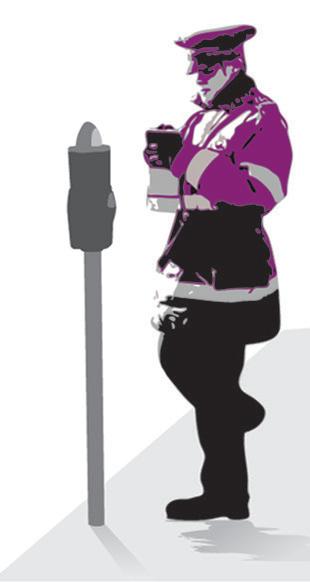


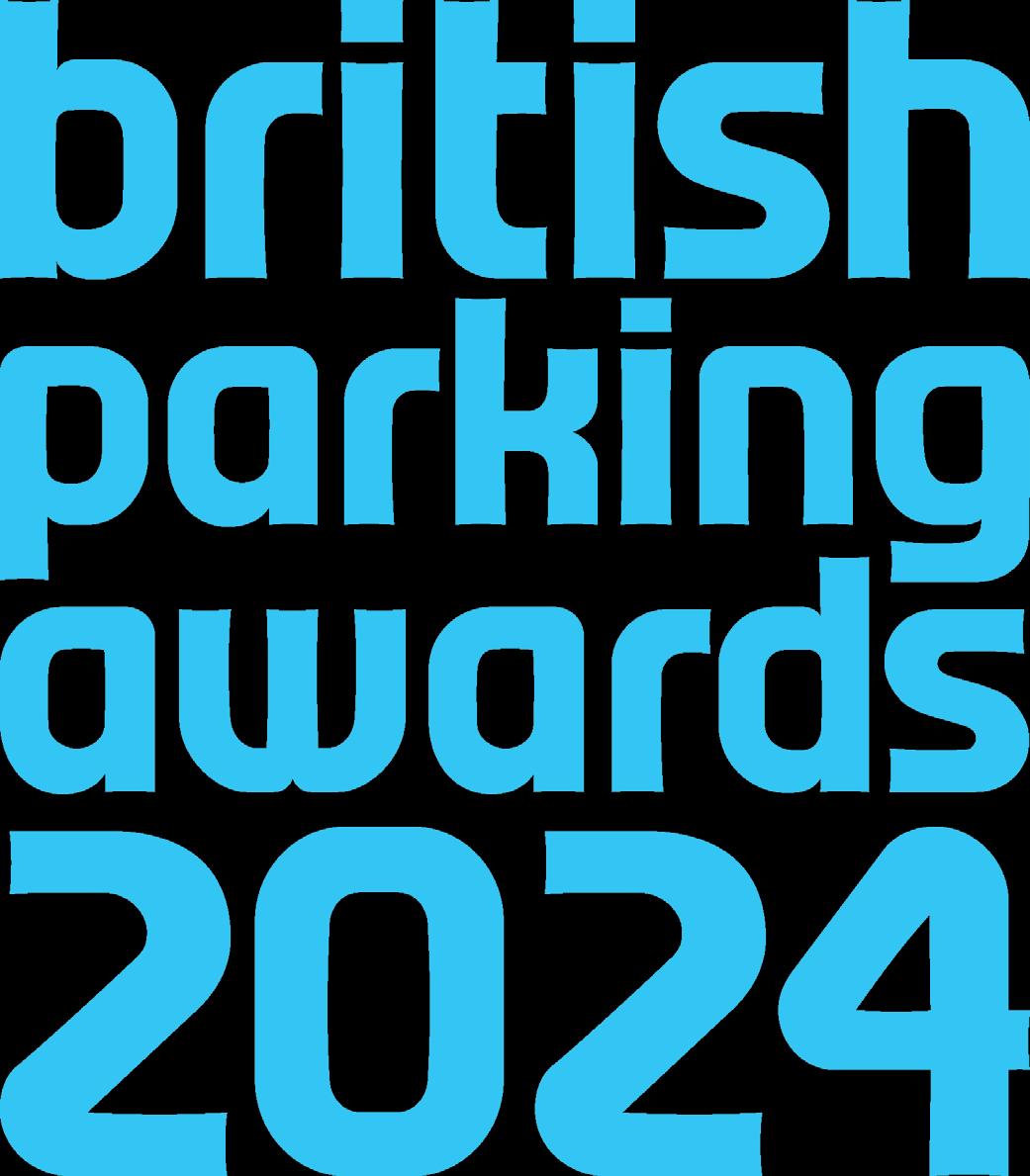



The British Parking Awards are back! The competition was launched by Parking Review magazine back in 2002 to celebrate achievement and showcase best practice. Now, in 2024, the competition encompasses the interlinked worlds of parking, connected vehicles and e-mobility.
The classic competitive categories recognise inspiring individuals, dedicated teams and partnerships, ground breaking technologies, effective communication, community engagement, and excellent car park structures.
This year thel Parking Rosettes strand will focus on two themes that showcase the positive and progressive aspects of parking in the form of a Connected Vehicles Award and the Acccssible Parking Award.
As the competition celebrates its 22nd year it continues to reflect the way in which the sector is evolving, as seen in the EVolution Award dedicated to electric vehicle infrastructure.
The entries are assessed by a jury made up of people with a background in parking, transport, technology and communications. They will draw up the short list and then decide the eventual winners, including the recipient of coveted MiPermit Inspiration Award.
Entry to the competition is free. Check the official website for deadlines and advice on how to submit your entry packs.
The finalists will be revealed in August and they will go forward to the British Parking Awards ceremony, which is held at the Royal Lancaster London on Friday 13 September
The British Parking Awards 2024 will be presented at the Royal Lancaster London by the renowned comedian and quizzer Paul Sinha.


A trained medical doctor Paul is perhaps best known as the ‘Sinnerman’ on the hugely popular ITV quiz show The Chase. As a comedian Paul has played every major comedy club in the UK, performed in 18 countries across the globe, taken eight solo shows to the Edinburgh Fringe, and won Best Club Comedian at the Chortle Awards in 2014.


One of the most well-known and trusted voices on British television, Roger Tilling is now firmly established as the voice of the British Parking Awards.
With over 25 years of television and radio experience, the UK's television networks have made Roger their first port of call when a Voice of God delivery is needed for major television events and primetime shows, from The Royal Variety Performance to The British Soap Awards, and Never Mind The Buzzcocks to Top Gear
The Parking Person of the Year award is open to all local authorities and private operators that may nominate an individual parking employee who has consistently made an outstanding contribution to the industry and represents a ‘model of excellence’.
Recipients may be young employees or recent joiners of any age. Local authorities and private operators can nominate an individual parking employee, consultant or contractor who has consistently made an outstanding contribution to their team and the wider parking sector.
The Parking Team of the Year Award recognises the excellent work of both on-street and off-street parking operations. It is open to teams working in both the public and private sectors.
This category is open to new and established car parks owned by either the public or private sectors. The award recognises car parks that are managed, designed and maintained in a way that makes the start and end of each driver’s journey a pleasant experience.
Recognising imaginative, engaging and informative approaches to communicating with the public and other organisations through advertising campaigns, websites, social media and publications.
The Back Office Award recognises the excellent work of back office teams working for local authorities, private parking operators, transport consultancies and civil enforcement agencies.
Dedicated to parking personnel who engage with drivers and the general public as a part of their day-to-day activities, this award will recognise excellent customer service, communication and community engagement.
The Parking Partnerships Award recognises the importance of partnership working in the parking sector. The partnership may involve pairings or groups of local authorities, companies, professional bodies, campaign groups and other stakeholders.
Parking is an essential service and can be a positive contributor to local communities. This award recognises people working within the parking sector who have engaged with and supported their local communities.
The Parking Technology Award recognises advances in the systems used to manage parking. The innovation will be a piece of parking hardware, a device or a wider system that makes the management of parking more efficient and/or customer-friendly.
The Best New Car Park Award is a site-specific category that recognises outstanding design and construction techniques that turn car parks into landmark structures.
The Best Car Park Renovation Award reflects how car parks can be transformed into inspiring buildings with a genuine social value and can host a variety of uses.
The new Traffic Team category recognises the skills and achievements of organisations responsible for implementing traffic and parking schemes such as CPZs, TROs, permit schemes, payment systems, EV charging and a host of other essential services – including planners, engineers, consultants and contractors.
A trio of trophies presented to people and projects that have made a real difference and positive contribution to the world of parking.
The MiPermit Inspiration Award recognises individuals and organisations that have made a significant contribution to improving parking. Inspiration Award recipients are exemplars of excellent practice that have inspired colleagues, clients and the wider parking community.
The Lifetime Achievement Award will be presented to a parking professional who has made an outstanding contribution to the sector over the course of their career. Parking organisations and professionals are invited to nominate an individual who has consistently made an outstanding contribution to the industry and represents a 'model of excellence' across their entire career.
The Special Jury Award is presented to a scheme, project or person that has particularly impressed the British Parking Awards jury, which is a panel of experts drawn from across the parking, automotive, transport and related sectors.
Special awards reflecting topical themes.
Satnav systems, digital mapping, mobile phones apps and ever smarter in-car systems are enhancing the ability of drivers to search for, book and pay for parking while on the move. The Connected Vehicles Award recognises the work being done to harness the potential of data and communications technology to enhance the parking experience of car, van and truck drivers.
Cars enable people with limited mobility and a range of health issues to make independent decisions about how they travel. But the benefits of having a car and the Blue Badge scheme only work if parking is made available and kept accessible at destinations such as town centres, shopping centres, leisure venues, hospitals, transport interchanges. The Accessible Parking Award recognises work done to provide accessible parking and to ensure such spaces are not misused.

The worlds of parking and electric vehicle charging are connecting. The parking sector is playing a key role in the transition to electric vehicles (EVs), as reflected in the launch of Parking Review's special EVolution section and website.
The EV Charging Award recognises the development of innovative approaches to providing EV charging infrastructure, systems and services in car parks and at the kerbside. The category is open to parking providers, chargepoint operators and technology developers.
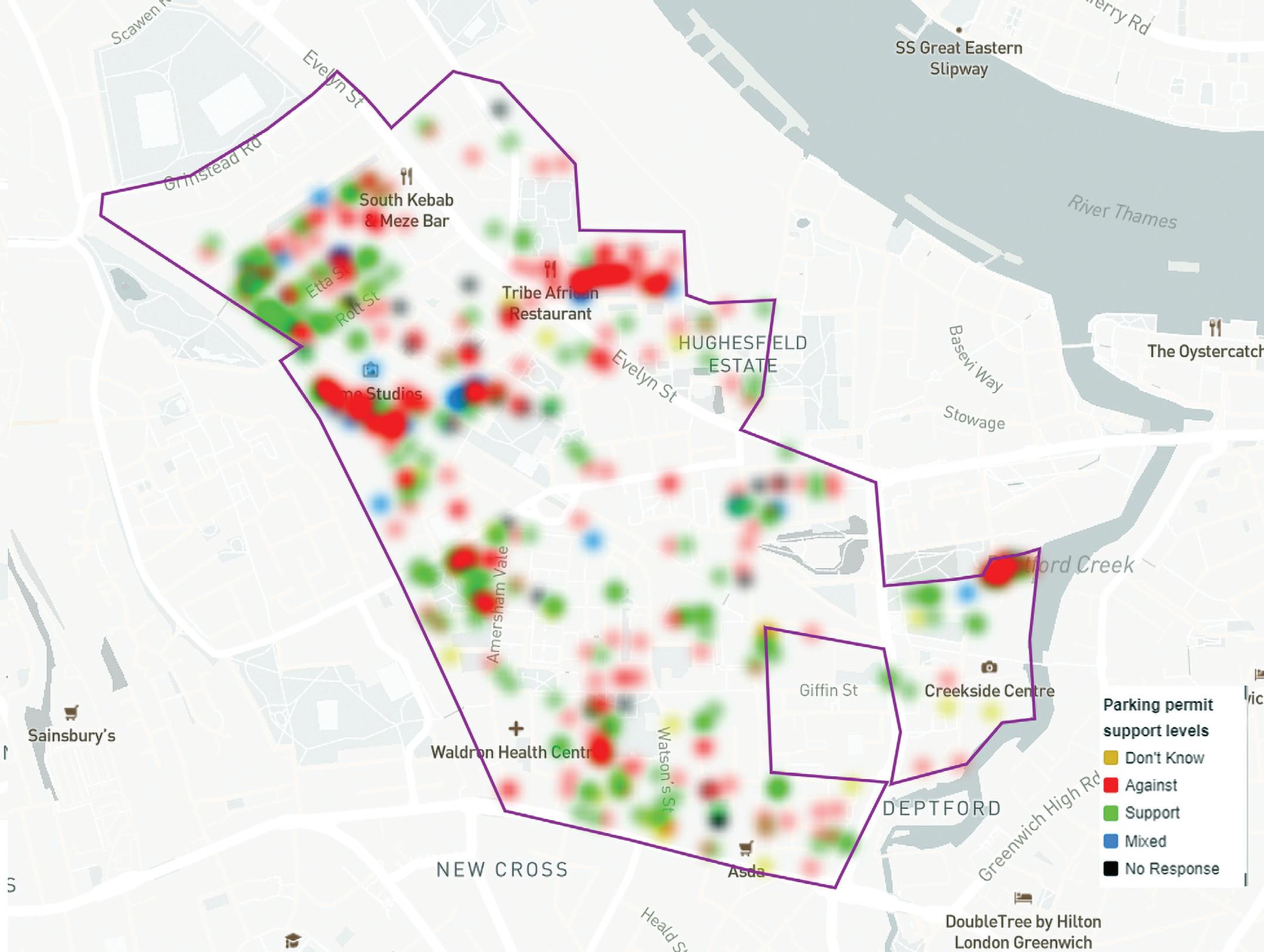
data analysis is an increasingly important aspect of consultations
Steph Bortoli and Olaseni Koya of Project Centre talk about how working with communities delivers parking policies and programmes that are bold, beneficial and fair
Parking consultations and changes are usually fraught with emotion and people’s connections not just to their car, but the road space (or pavement!) they park it on. As a result, there is often a lot of political interest in these processes and the data that results.
It’s therefore important to make sure you deliver robust consultations, which present a strong evidence base, good participation, useful analysis and build confidence in decisionmaking processes. At Project Centre, we’re working with local authorities across the UK to create robust parking policies and programmes, which deliver their strategic objectives and respond to the needs of local people. We can only do this if we involve communities and respond to what they say.
Increasingly in parking consultations, we’re not just focussing on parking, but thinking about what else is happening in that area. It’s worth considering if there are opportunities for you to have a more holistic conversation with the community about a range of improvements, with parking as one element of that.
The Sustainable Streets programme, which we have supported in the London Borough of Lewisham, does just that. It’s not just parking permits we’re asking the community about, but their whole streets. Our consultation explores wider opportunities and challenges with kerbside space, such as:
• Where do you need electric vehicle chargepoints?
• Where might people need a disabled parking bay?
• Can we look at street trees and greening as part of car parking space reallocation?
• Is there a place for cycle parking?
• Is there enough provision for visitors to this area?
• Should some of these bays be replaced with car club options?
• Are there opportunities to reduce street clutter?
Impactful communication is really important when talking about parking policies and proposals. One of the things we often see in consultations about parking projects is that they are directed to one section of the community, sometimes just to drivers or just to non-drivers, and to the detriment of the other parts of the community. Parking is a public service and affects all parts of the community. Making sure your communication speaks to everybody in a community is really important, so everyone can understand how changes to parking impact them and others in their neighbourhood.
Images are also really important in your communication to ensure people are engaged, and not just images of parking signs!
In terms of communications, be mindful of the Gunning Principles as they pertain to parking consultations. You should communicate in a way that provides your community with the information they need to participate fully in the consultation, and therefore ensuring you comply with case law.
Another important aspect of parking consultations is collecting the right information from communities. You need information that is genuinely going to inform your decision-making process.
A good way to do this is to work backwards from what you need to know and design your questionnaire or survey from there. Too often we see surveys with too many questions, that
ultimately aren’t being analysed as part of the decision-making process. Think carefully about what information you genuinely need to inform a decision, and ask those questions, as having too many questions can be a barrier to participation.
Recently, we created a survey with just six questions and put this in a leaflet with a tear-off, fold-and-post page. This made it really easy for people to participate and it significantly increased the participation rate.
In terms of capturing the right information, we are quite clear with clients that when it comes to parking consultations, and particularly controlled parking zones (CPZs), we advocate for capturing home address information.
Sometimes with consultations we might distribute something to an area, but actually, we welcome responses from the wider region, or visitors to that area, and a much wider community. We don’t advise this for CPZ consultations because there is a much clearer, direct impact, predominantly financial, and we need to be quite careful that we weigh responses in a fair and proportionate way, so people outside of that direct impact area are not unduly influencing the decision-making processes. It also helps response mapping in terms of getting insights into localised issues, which is something you can be really responsive to when it comes to parking. For example, you can follow clusters of reports of pavement parking, and take action in these specific areas.
Another reason we provide response mapping is so we can understand where responses aren’t coming from within the
The Gunning Principles were coined by Stephen Sedley QC in a court case in 1985 relating to a school closure consultation (R v London Borough of Brent ex parte Gunning). Prior to this, very little consideration had been given to the laws of consultation. Sedley defined that a consultation is only legitimate when four principles are met:
1. Proposals are still at a formative stage
A final decision has not yet been made, or predetermined, by the decision-makers.
2. There is sufficient information to give ‘intelligent consideration’
The information provided must relate to the consultation and must be available, accessible, and easily interpretable for consultees to provide an informed response.
3. There is adequate time for consideration and response
There must be sufficient opportunity for consultees to participate in the consultation. There is no set timeframe for consultation, despite the widely accepted 12-week consultation period, as the length of time given for consultee to respond can vary depending on the subject and extent of impact of the consultation.
4. ‘Conscientious consideration’ must be given to the consultation responses before a decision is made
Decision-makers should be able to provide evidence that they took consultation responses into account.
These principles were reinforced in 2001 in the ‘Coughlan Case’ (R v North and East Devon Health Authority ex parte Coughlan), which involved a health authority closure and confirmed that they applied to all consultations, and then in a Supreme Court case in 2014 (R ex parte Moseley v LB Haringey), which endorsed the legal standing of the four principles. Since then, the Gunning Principles have formed a strong legal foundation from which the legitimacy of public consultations is assessed, and are frequently referred to as a legal basis for judicial review decisions.
Source: Local Government Association
community. We can then review this in the first couple of weeks of a consultation and do door-knocking, put up additional on-street communications, or pop up in the local area for one or two hours.
One of our local authority clients had a programme of 19 CPZ consultations to be delivered over an 18-month period. We overhauled the communications approach, making it easier for people to participate and we explained more about various policies, including net zero impact neighbourhoods.
We went from a response rate of about eight and nine per cent to an average response rate of about 32%, and in some cases up to almost 60%, which is really significant. While consultation responses aren’t the only evidence base to be used in parking strategies and policies, a higher response rate certainly gives confidence in decision-making, particularly if approvals go through the political level.
Some of you may already be using technology participatory mapping technology. At Project Centre, we use Commonplace for a number of reasons. When it comes to parking consultations, Commonplace is a great way to collect initial evidence and enable you to better target your proposals and policies. We also work with many of our clients to use their own participatory mapping tools and platforms.
For Lewisham’s Sustainable Streets programme, we provided participants with prompts to understand where parking is causing problems, where pavement parking is disruptive or where more sustainable measures might make better use of road space currently dedicated to car parking. We are then able to collect that evidence and present proposals back to the community that responds directly to what they have told us, increasing the likelihood of support.
In terms of analysing the information, we are increasingly using PowerBI to track consultation responses and parking surveys in real-time.
For schemes like CPZ, this detailed localised analysis helps us understand whether there are smaller areas with really strong support rates and increasingly, we are seeing local authorities progress with these smaller areas to meet the needs of communities. When PowerBI is used cumulatively as you deliver individual consultations, you can start building a picture across the borough, which in turn can help local authorities make wide ranging policy decisions, not just about individual parking consultations. Increasingly, this cumulative data visualisation is being used to forward plan where to focus next for a CPZ, or identify opportunities where related policies or programmes can add and maximise the success of a CPZ, for example, in the form of electric vehicle (EV) infrastructure strategies and low traffic neighbourhoods (LTNs).
With parking revenue a significant opportunity area for local authorities to reinvest back into their streets, and deliver the local walking, cycling and sustainable infrastructure required, successful and comprehensive parking policies – underpinned by high-quality communications and consultation – are more important than ever.
Steph Bortoli is head of communication and engagement at Project Centre stephanie.bortoli@projectcentre.co.uk


Olaseni Koya is associate director parking at Project Centre olaseni.koya@projectcentre.co.uk
Project Centre is a design, engineering and landscape architecture consultancy creating places that are attractive, innovative, sustainable and safe. It is part of Marston Holdings. www.marstonholdings.co.uk/projectcentre


Lewisham Council wanted to reimagine roads and streets across the borough, creating better streets for residents, reducing congestion and air pollution, improving road safety, and encouraging more people to walk, cycle or use public transport. In January 2023, the London borough, supported by Project Centre, launched its first consultation on the Sustainable Streets programme.
Over 75% of roads across Lewisham had unrestricted parking. The council knew controlled parking zones (CPZs) were a powerful tool for discouraging commuter traffic and short car journeys, and were being underutilised, however the Sustainable Streets programme reflects CPZs are most beneficial when combined with the delivery of other measures to support, enable, and encourage more sustainable travel.
The Sustainable Streets programme proposes better use of road space and pavements in the borough through the management of on-street parking, alongside the introduction of more trees, secure cycle storage hangars, car club bays, electric vehicle charging points, and road safety measures.
Project Centre was tasked with parking surveys, feasibility, consultation, detailed design and implementation support.
• Briefings with local and borough-wide stakeholders to share an overview of the programme aims and objectives, and upcoming consultation process.
• Leaflets to more than 20,000 properties across the Catford, Crofton Park and Deptford areas, including a proposed design for every individual street.
• Information about how to participate in the consultation and request information in another language or format.
• Before and after visualisations to help people reimagine how car parking space could be changed to create more sustainable streets.
• An animation explaining the programme was also created for use across social media.
• Traditional and digital channels were used to share information about the consultation, including in council newsletters and on NextDoor.
The Sustainable Street approach will see the creation of an enhanced mobility mix that features cycle bays, disabled parking, car club bays and electric vehicle charging AFTER

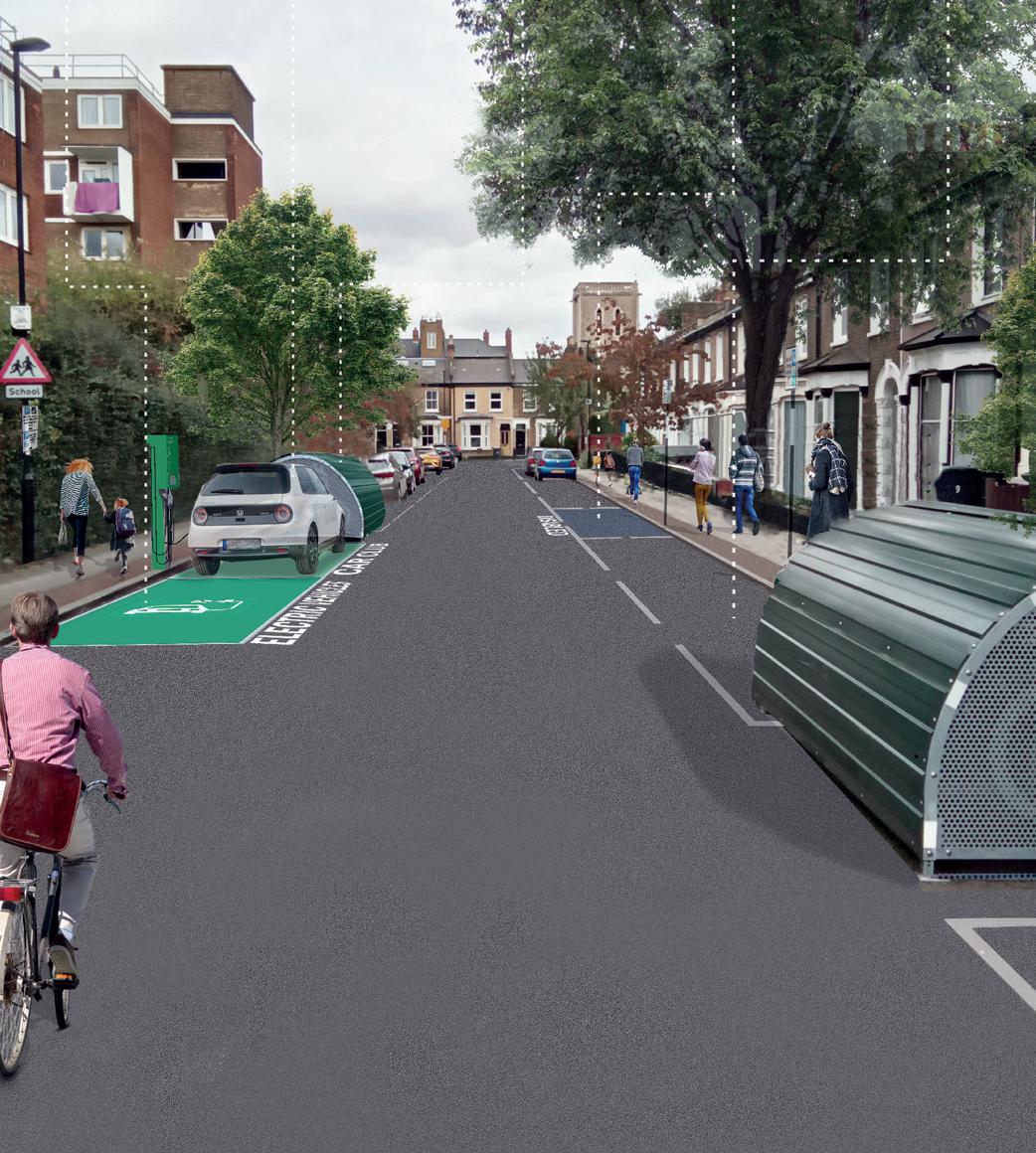
• The team spoke with over 500 people at 10 pop-up sessions.
• Conducted more than 50 visits to speak directly with businesses.
• Door-knocked just over 350 properties in areas with low response rates.
• Over 3,800 responses were submitted to the online survey, with 240 people completing hard copies collected at local pick-up locations or requested via a voicemail service.
Using PowerBI, Project Centre’s team were able to develop a real-time spatial analysis of levels of support for various measures within the programme. This information was also used to understand areas of low response rates to target door-knocking and communications activities.
In July 2023, several recommendations were developed with consideration of the feedback received during the consultation, these included:
• Implementing double yellow lines at junctions on all roads across Catford, Crofton Park and Deptford due to strong support for improving safety at crossings.
• Rolling out the Sustainable Streets programme in full across the Deptford area, and in two smaller areas in Catford and Crofton Park.
• Updating policy to allow Blue Badge holders to park in any CPZ in the borough free of charge to minimise the impact of new CPZs on disabled people.
All recommendations were endorsed by the mayor and cabinet, and the programme has now been delivered in these areas. Some improvements to the engagement and consultation process were also identified, and this will begin for the next phase in the coming months.
Residents and businesses in a new CPZ will be entitled to a 15% discount for the first year of their parking permit.
With strong leadership at both the officer and political level, the London Borough of Lewisham has set ambitious delivery targets for the Sustainable Streets programme and aims to engage with the entire borough over the coming years.
Steph Bortoli is head of communication and engagement at Project Centre stephanie.bortoli@projectcentre.co.uk
Tuesday 25 June 15 Hatfields, London SE1
Organised by:Presented by:Sponsored by:

Enforcement Excellence 2024 is the UK's leading forum for the discussion of policy thinking, legislative developments and operational best practice in the fields of traffic management, parking projects, air quality schemes and debt recovery.
The exhibition will enable attendees to check out the latest systems and services on offer to the traffic, parking and air quality management sector. To participate contact Jason Conboy: 020 7091 7895 or email: jason@landor.co.uk
Exhibitors include:





Supported by:

Speakers include:
l Russell Hamblin-Boone, Chief Executive, CIVEA
l Tom Gallagher, Parking Fraud Investigations Manager, LB Lambeth
l Will Hurley, CEO, International Parking Community (IPC)
l Carole Kenney, Director Welfare, Road Traffic & Road User Charging, CDER Group
l John Mason, Managing Director, TRACE Group
l Chris Newman, Head of UK Operations, Trellint
l Sara Roberts, Head of the Approved Operator Scheme, British Parking Association (BPA)
l Trevor Taylor, Operations Director, Trellint
l Michael Wiktorko, Service Area Manager, Parking Enforcement, Hackney Council
l Chris Williss, Product Consultant, Trellint
l Alan Wood, Chief Executive Officer, National Persistent Evader Database (NPED)
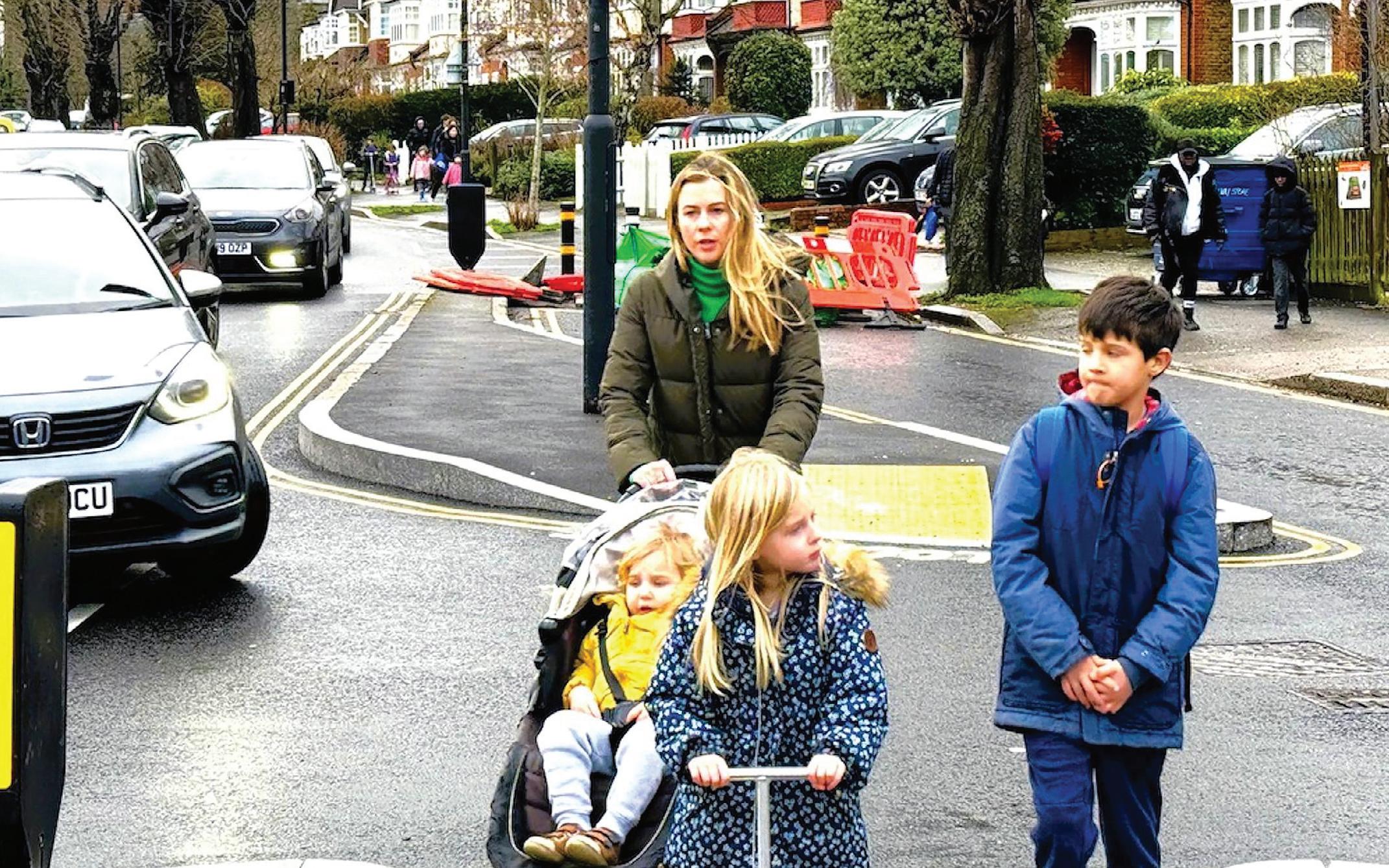
Co-founder of Solve the School Run Nicola Pastore said: “Every morning and afternoon I run the gauntlet of double-parked cars, congestion on crossings, idling and road rage, to walk my three young children to school. It’s the most dangerous part of our day.”
Quarter of pupils driven to primary school in capital, writes Deniz Huseyin
Aquarter of pupils in London are driven to primary school every weekday, generating an extra 240,000 car trips during each of the morning and afternoon rush hours. The findings are part of new analysis on transport for schools conducted by campaign group Solve the School Run. “Researching the situation, we were amazed at the systemic problems surrounding the school run for UK families,” the group said. “From road danger, preventing pupils from travelling independently, to a shortfall of government infrastructure and information in place that enables collective pupil travel to help working families.”
Solve the School Run is calling for more cargo-bike friendly measures to be introduced as well as a fleet of US-style school buses. The group was surprised to discover that problems around the school run are as bad in inner London as in outer London, with 25% of children being driven to primary school in inner London boroughs, compared with 24% in outer London boroughs. Modelling carried out by the group found that the distances that pupils are travelling to primary schools in inner and outer London is almost the same, despite large differences in housing density.
Kensington and Chelsea has one of the highest modelled rates of primary-aged pupils being driven to school in London, with 36% being taken in a car to drop off and pick up. “This is largely because pupils in the borough tend to travel longer distances to school and attend ‘non-catchment’ primary schools which can select from pupils beyond their local area,” said the group.
By comparison, 18% of primary pupils in Waltham Forest are driven to school, reflecting the fact that more than eight in ten pupils (82%) go to a school which is less than a mile to travel to from where they live, Solve the School Run found.
Camden also has one of the highest modelled driving rates, with 29% of primary pupils being driven to school. “This is
primarily because Camden has a high proportion of ‘noncatchment’ primary schools where pupils are selected from beyond their local area and have longer and more time-consuming school run journeys.”
Co-founder of Solve the School Run Nicola Pastore said: “Every morning and afternoon I run the gauntlet of double-parked cars, congestion on crossings, idling and road rage, to walk my three young children to school. It’s the most dangerous part of our day.
“With so many families travelling more than a mile to school, they need more help to get to school in a way that is healthy, less stressful and doesn’t damage our local environment. That could include electric cargo bikes or staffed walking buses and cycle groups. Imagine if our big cities had yellow buses, like in the US, which remove the need for every parent to go on the journey every day. We need change.”
The group is calling for more publicly funded support for the school run, including funded and staffed walking groups or cycling groups, or funded school buses, which are more commonly used in the United States, Germany, Spain and Norway.
In England, children only get funding for school transport if they are under eight and the school is more than two miles away, or if they are either or eight and over and the school is more than three miles away, according to Solve the School Run. However, in the US yellow school buses are available for anyone that lives more than one mile from their school. In some major cities such as New York, support is available if you live just half a mile away from school. In the USA, over half of children go to school on a school bus, compared with just 6% of pupils in the UK. In the US free bussing is, with a few exceptions, available to all pupils who live over one mile from school.
Other potential options that the government should consider supporting include: official ‘walking buses’ or ‘bike buses’, with staffed marshals walking or cycling pupils from ‘stops’ to school; and subsidised electric cargo bikes, so parents can take their children longer distances and beat the traffic. www.solvetheschoolrun.org
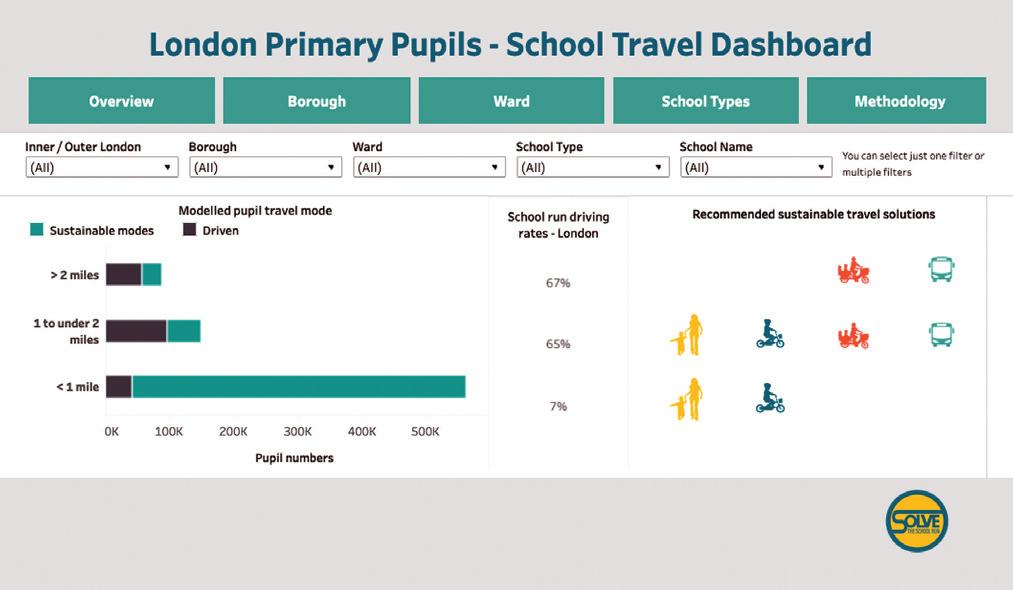
Solve the School Run has developed a data model that sheds light on parents’ habits across London
Adashboard that displays school run traffic across primary schools in London has been developed to illustrate current travel behaviour. The data model, developed by campaign group Solve the School Run, is designed to help parents better understand school run traffic, and work out which school trips are most likely to be made sustainably and which are likely to be driven.
The analysis will help campaign groups and councillors quantify the numbers of pupils making these journeys at a local school, ward or borough level, and strengthen the case for safer streets, says Solve the School Run.
Set up by Claire McDonald and Nicola Pastore, Solve the School Run is a group of parents and residents with children at state and private, primary and secondary schools. The group says: “We are passionate about reducing school run traffic and want to create more convenient and sustainable travel choices for families. We worry about the road danger our children face on their way to and from school and that they are being exposed to health-damaging levels of air pollution.
The dashboard that Save the School Run has developed is based on the Department for Transport’s National Travel Survey (NTS) analysis. The NTS indicates the average driving rate for a London primary pupil travelling under one mile to school is 7%, which increases to 65% for distances of between one and two miles.
“The distance pupils have to travel to school is a huge determinant of how they travel,” says Solve the School Run. “The larger the catchment area of a school, the higher the levels of driving.”
Solve the School Run is calling for better publicly funded infrastructure for journeys over a mile. This, it says, could involve: staffed walking or cycling groups; better cargo bike infrastructure, such as subsidies and secure cargo bike parking; or flexible mini-bus services for schools with larger catchment areas.
For many London wards and boroughs, an estimated 70% of primary pupils are walking or cycling short journeys of under one mile to their local primary schools, says Solve the School Run. “That is 560,000 primary pupils who often make these journeys alongside very high levels of traffic, high pollution levels and limited safe route infrastructure like cycle lanes or zebra crossings.”
The data model includes an estimate of pupil travel distances and modelled driving rates for school types with longer school runs, such as independent schools. This school type selects pupils from beyond their local area, which means primary pupils may have longer school runs, and associated higher levels of driving.
Unlike state schools, independent schools do not have to disclose their pupil distance information, so they have typically been left out of analysis of this type, says Solve the School Run.
“However,“ the group says, “making up 10% of total primary pupil numbers in London, up to 45% in some boroughs and wards, they are an important part of the issue, which is why an estimate has been included.”
www.solvetheschoolrun.org/our-data
Mayor of West Yorkshire Tracy Brabin champions schemes that encourage walking and cycling


School Streets effectively address the congestion, road safety and air quality concerns that many schools experience. Monitoring of schemes has revealed how they are enabling children and families to safely walk, wheel, scoot or cycle to school. And by making active travel possible for everyone, they help contribute to efforts to tackle the health crisis and climate change. These were key messages for delegates attending the School Streets North conference in Bradford, West Yorkshire.
School Street restrictions are only in place during term time and at times linked to the start and end of the school day. Signs at the entry points notify drivers of the timed restrictions. Some vehicles, for example those belonging to residents and businesses within the School Street, will be given a permit to enter and leave the area. Certain types of vehicles are exempt, including emergency vehicles, utility providers on emergency calls and Blue Badge holders, when their destination is within the School Street zone.
In her keynote address at School Streets North, Mayor of West Yorkshire Tracy Brabin said School Street schemes help make school journeys safer, healthier and more enjoyable. She said that 33 School Streets had been implemented in the region since 2019 and that another 15 School Streets are to be introduced across West Yorkshire, funded by Active Travel England (ATE). Brabin said: “I have made Vision Zero a central plank of my Policing and Crime Strategy. We can do so much around the school gate to ensure that we make streets safer. School Streets help people in the region to think differently about the school run, seeing it less as a chore and more a cherished time with family.”
The School Streets schemes would complement West Yorkshire Combined Authority’s decision to retake control of bus services under its franchising plan. The mayor said: “It will mean you can hop on the bus that gets you to school on time, with routes no longer cut back by operators because they are not cost effective.”
Another compelling reason for more School Streets is they help improve air quality, Brabin said. “We need better air quality to lower asthma levels across the region. One in 20 people in West Yorkshire die from poor air quality associated disease. It is up to all of us to prove to the next generation that we cared about them and their families, and we must act with urgency to make changes.”
Parents who have to drive long distances to work after dropping off their children should be encouraged to try ‘park & stride’ where they park away from the school, suggested Brabin. “They can walk with their children, which sows the seeds of better mental health and gets young people used to walking,” she said.
Research by West Yorkshire Combined Authority shows that journeys taken in cars make up 24% of West Yorkshire’s carbon emissions. “I have committed to reaching Net Zero by 2038,” said Brabin. “We are not going to deliver that unless we get people out of their cars, and the car is not the first choice for families. Those practical alternatives have to be made and School Streets are absolutely at the heart of the solution when it comes to the climate emergency.”
School Streets North was organised by Landor LINKS and hosted by the Mayor of West Yorkshire and the West Yorkshire Combined Authority. It is part of a series of School Streets conferences being organised across the UK by Landor LINKS. www.landorlinks.uk

























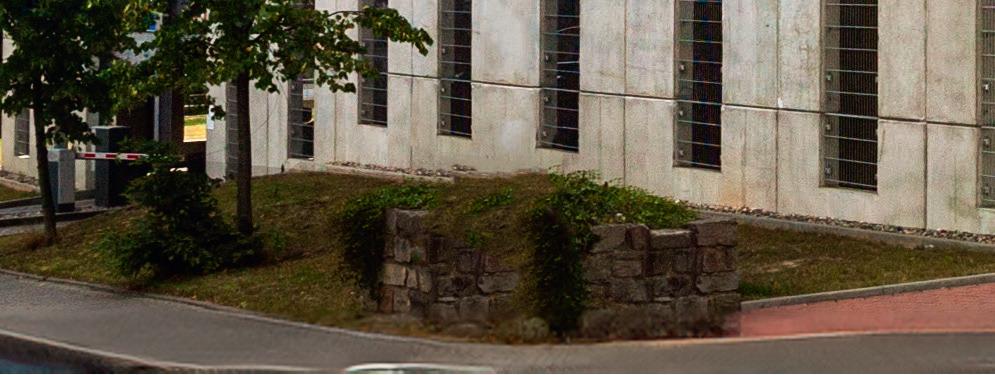






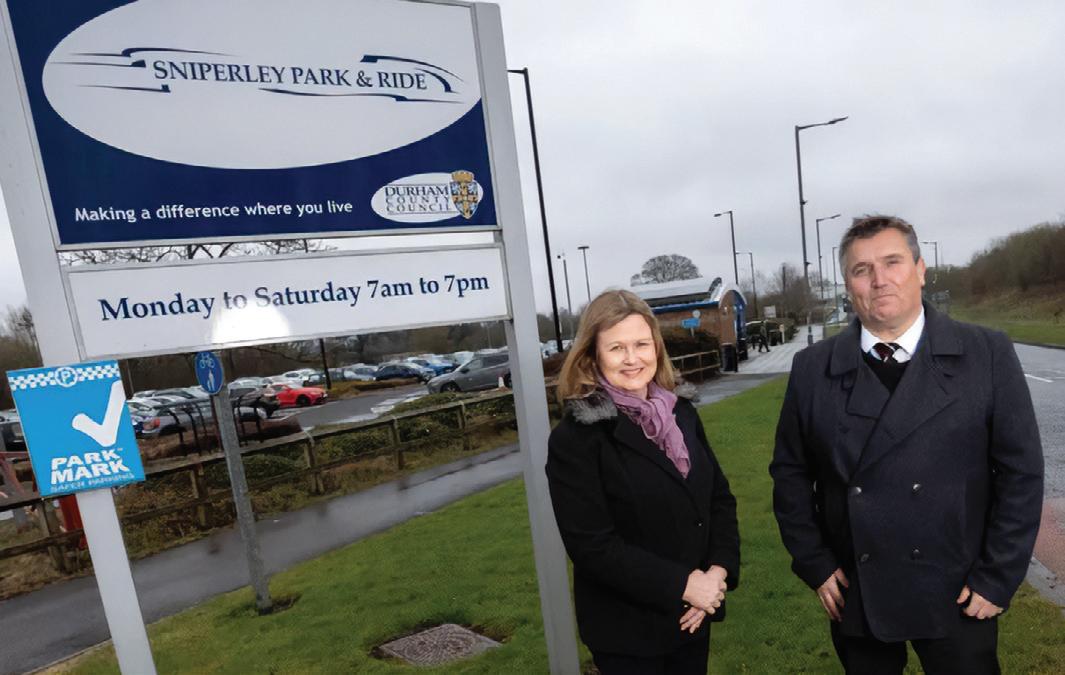

A Durham park & ride site is set to undergo a £2m expansion. The project will see capacity at the Sniperley Park & Ride site, on the outskirts of Durham City, increase to almost 600 spaces.
The extension is made possible by a successful application to the government’s Transforming Cities Fund.
The Sniperley Park & Ride site is located between the A691 and A167 and currently has 326
spaces. Planning permission is in place for the expansion which, on completion, will see an additional 262 spaces created. This will include increased provision of standard, disabled, electric charging and motorhome bays.
Cllr Elizabeth Scott, cabinet member for economy and partnerships, said: “We are delighted to be ready to begin work to grow Sniperley Park & Ride. This site and our other park & ride facilities around Durham are crucial as they help tens of thousands of people each year get in and out of the city, whether that be to access work, shops, leisure or
Oxfordshire County Council has completed work on a £51m park & ride site, but has yet to secure funding for an access road.
The funding to construct the road in and out of the 850space car park in Eynsham, Oxfordshire, has not yet been secured.
The car park, located off the A40, was completed in January apart from some landscaping. However, it will not be fully operational for another two or three years.
There are plans for a new roundabout to make it easy to access the park & ride from either direction, but the council said it is still in the process of securing funding.
A spokesperson for Oxfordshire County Council said: “Completing the park & ride site now, ahead of the rest of the work in the area which required more complicated approval, has saved millions of pounds in inflation and construction costs.
“We are talking to Homes
England and the Department for Transport, the main funding bodies for the programme, to agree a way forward. Our conversations with them are at an advanced stage and we hope to be able to share more soon.
“The current timeline suggests the park & ride could be fully in use by 2026 or 2027, subject to planning and construction.”
It is anticipated the Eynsham P&R will cut up to a third of the peak traffic travelling in each direction on the heavily congested A40 between Witney and Oxford.
Oxfordshire now runs the largest park & ride system in the UK, with almost 6,000 parking spaces at five sites around the city of Oxford.
The first permanent park & ride in the UK was opened in Oxford in December 1973 and comprised a car park and a dedicated bus service. That site at Redbridge is still running, having grown from 250 spaces 51 years ago to 1,500 in 2024.

health services.
“As well as supporting economic growth, they also benefit the environment by increasing use of sustainable transport, reducing car journeys and cutting emissions in the process.
“It is vital that as our city grows, its infrastructure – including park & ride provision – grows with it and we look forward to the expanded Sniperley facility helping people with their everyday journeys for years to come.”
Work on facility will start on Monday 15 April. Vegetation clearance and sewer works have already been carried out and the
site is ready for construction to begin.
The work is expected to last approximately six months, with a park & ride service continuing to be available throughout.
As the construction work will be off-road, it is expected to have minimal impact on journeys through the area.
The Sniperley and Belmont Park & Ride sites will be in operation on Sundays. Buses will serve the sites between 7am and 7pm, seven days a week. This will include bank holidays except Christmas Day, Boxing Day and New Year’s Day.

A new bus station and multistorey car park in Crewe are expected to open by the end of May. These facilities were to have been the first phase of a now cancelled scheme called Crewe Royal Arcade.
Cheshire East Council bought a town centre site in 2015 for £6m with plans to build a bus station, multistorey car park, as well as a mixed-use scheme leisure and retail scheme.
The council signed a development agreement for the site with Peveril Securities in October 2020 and work on phase one – the bus station
and car park – started on site in April 2022.
However, in November 2023, the council announced the second phase of Royal Arcade would not be going ahead. The council cited the scrapping of HS2 and rising costs as reasons for rethinking the scheme.
With Royal Arcade shelved, the council said that site would be used for temporary ‘meanwhile uses’, which could include a children’s play area, go-karting track, trampoline park, pop-up cinema or space for traders to sell food and drink.
THURSDAY 11 JULY 2024
BIRMINGHAM CONFERENCE & EVENTS CENTRE
Mobility hubs are spaces where public, shared and active travel modes are co-located alongside improvements to the public realm. They enable travellers to make smooth and safe transfers between different modes, swapping private cars for shared vehicles, bikes, buses, trains, scooters or walking.
The annual Mobility Hubs conference has now become an eagerly anticipated date on the calendar of the transport and planning sector.
The third annual Mobility Hubs conference sees speakers and expert panels explore the design, implementation and operation of mobility, EV and service hubs. The day will draw on real world experience and showcase best practice from around the UK and internationally.
If you are interested in speaking or taking part in a panel contact Mark Moran at: mark.moran@landor.co.uk
If you are interested in exhibiting contact Jason Conboy at: jason@landor.co.uk or call: 020 7091 7895

Grindley Hill Court multi-storey features electric vehicle bays
University Hospitals of the North Midlands (UHNM) NHS Trust has officially opened its new staff car park in Newcastleunder-Lyme.
The car park has 1,680 spaces for staff, including 84 for electric vehicles, under a project costing £32m.
The new car park at the former Grindley Hill Court, Royal Stoke University Hospital replaces the existing staff parking spaces provided at the Royal Infirmary and Central Outpatients Department sites.
The creation of the car park leaves the way for the former Royal Infirmary to be developed for local housing and community services.
Tracy Bullock, UHNM chief executive, officially opened the multi-storey car park in a ribbon cutting ceremony attended by representatives from UHNM, contractors IHP, Stoke City Council planning department and local residents.
Bullock said: “I am delighted to officially open our new staff car park. If we have got staff parking in the right place, it helps ease the burden on parking spaces for our patients and visitors and supports our local residents also. I would like to
Plans for a car park and a shuttle bus service to serve the Royal Derby Hospital have been approved.
The 368-space park & ride system at Kingsway Boulevard will be in place for up to two years while a new multi-storey is built.
The bus would run every 20 minutes with the site operating from 8am to 6pm seven days a week.
People can also choose to walk to the hospital, which would take between 15 and 20 minutes.
Details around costs have not yet been disclosed.
The temporary car park and shuttle bus service will be situated off Kingsway Boulevard
The plans prompted 13 official objections from nearby residents, who raised issues around traffic, air pollution
noise and litter.
In a statement, applicant University Hospitals of Derby and Burton NHS Foundation Trust said construction of the multi-storey car park cannot commence until a temporary car park has been provided.
Ian Woodhead, development control manager at the council, said the site presents a number of issues, with junction modelling at Kingsway predicting the car park will add to congestion problems during peak times in weekday evenings.
However, the location was the only option for providing temporary parking to allow the 850-space multi-storey car park to get off the ground.
Councillors on the planning committee suggested installing signs to let people know how many spaces are available at the car park.


thank all teams involved in bringing this project in on time and within budget but also to our local planners and residents for their patience and willingness to work with us.”
Lorraine Whitehead, director of estates, facilities and PFI at the Trust, said: “We are thrilled to be able to open our new car park which improves NHS facilities for staff, enables better car parking for our patients and allows for the redevelopment of the Royal Infirmary site.”
The trust chose to acquire Grindley Hill Court, which sits adjacent to the Royal Stoke University Hospital, because it was considered the best local option for future expansion of
hospital services and, earlier this year, it was granted public funding to purchase the land.
Grindley Hill Court previously housed NHS staff, including temporary and part-time staff, who have now vacated the site so the land may be readied for demolition. The trust has been assisting these residents in their move, including support in removals and finding alternative accommodation.
UHNM says it is committed to engaging with local residents and stakeholders throughout the demolition and development phases, and will ensure that any queries are addressed by a member of its dedicated project team.
The operator of a car park at Hull Royal Infirmary has asked requirements to improve facilities to be dropped.
An application lodged with the city council by Bank Park for the Fountain Street car park asks for the removal of planning obligations and for it to be allowed to continue to operate beyond August 2024.
Bank Park said requirements to mark out and light the surface car park did not take into account future plans for the site.
The area has been set aside for the redevelopment of the hospital. A masterplan to develop the infirmary unveiled in November 2022 has part of the Fountain Street site earmarked as a multi-storey car park, with the remainder as unspecified potential future development.
The company’s application seeks to remove a condition requiring
improvements so that the car park could continue to operate until at least 2027. “Decisions on previous applications on this site have reflected a desire to have a surfaced, marked out, lit car park,” the application said.
“However, laudable though this aim may be it does not take account of the fact that when a car park has an unknown future, the operator is not going to make a large investment in improvements.
“Using resources and energy to carry out work which will be removed in the near future runs counter to the principles of sustainability. Renewal of the planning permission would assist the aim of the plan to provide adequate parking, but would not thwart the longer term aim to redevelop the site with a multi-storey car park and an unspecified built development.”

Cars are rapidly becoming both wider and heavier, with recent analysis confirming average growth of 1cm in width every two years. This poses a real challenge for car park operators who must accommodate bigger vehicles on finite plots of land, while facing more pressure than ever to provide additional features, such as electric vehicle charging, as well as ensuring their facilities are safe, aesthetically pleasing and well-maintained. This is a pressing issue commercially; research shows more than half of drivers would consider a more expensive public car park if the surface quality and line markings were better quality.
In the EU and UK, new cars have grown 1cm wider every two years according to figures from the campaign group, Transport & Environment (T&E). Analysis of the data shows this change has been driven by a rise in larger luxury sports utility vehicle (SUV) models entering the market and gaining popularity among drivers.
This change is not projected to slow down, with almost half of new cars now too wide to fit in parking spaces designed to the minimum on-street standards in many countries (Everwider: why large SUVs don’t fit, and what to do about it –transportenvironment.org)
And it is not just large SUVs that are transforming the car market. Electric vehicles are making models heavier and larger, due to increased space requirements needed to accommodate weighty batteries.
Combined with the UK government’s pledge to stop the sale of all petrol and diesel cars by 2035, it is clear to see why parking facilities urgently need to adapt to make room for wider, heavier, and overall larger vehicles in the very near future.
There are some clever line marking tricks that organisations can use to combat poor parking. Drivers are influenced by repeated behaviours and a range of psychological factors come into play when choosing and parking in a space.
WJ’s latest research surveyed 501 UK drivers about parking maintenance and the results reflect an increasingly dissatisfied parking population, which is heightened by poor parking and larger vehicles taking up more than one space.
To counter this, not only should bays be accommodating for larger SUVs but behavioural nudge techniques should also be used to encourage better parking from all drivers. With the number of spaces available on new developments restricted in the UK due to planning policies, maximising space is key.
‘Nudge’ parking spaces alleviate this strain. These cleverly designed bays use tools such as twin lines to encourage parking in the middle of the space, maximising space either side of vehicles, and minimising hazardous manoeuvres in and out of tight spaces to keep both pedestrians and drivers safe.
As cars become wider, they are also becoming heavier. This is especially so for electric vehicles because of the weight of the battery. The difference in weight between the exact same model of car is substantial.
Take the Peugeot 208 for example, which is available in petrol and electric variants. The 1.2-litre petrol model weighs 1,090kg, whereas the all-electric e-208 with a 50kWh battery weighs 1,910kg, making it almost twice as heavy.
Increased weight causes problems for surfaces and line markings because of greater torsional forces. Heavier cars exert more force through the car’s wheels when power steering is engaged. This means the length of time it would have usually taken for standard line marking materials to fade is decreasing thanks to these heavier models, leaving parking facilities in need of more frequent maintenance.
The aesthetic of parking facilities is not the only thing that is affected by this. Drivers’ feelings about parking their vehicles are also negatively impacted. WJ’s research showed clear apprehension among drivers when it comes to faded lines. Threequarters (66%) of those surveyed would feel anxious about parking in a public car park if there were missing, faded or excessively narrow line markings.
This response highlights a hesitancy among drivers, which will only increase with the rise of heavier vehicles, deteriorating lines quicker than before. This is exacerbated when factoring the increasing width of vehicles, because no longer do cars fit within lines but they park on or over them, worsening the problem over time.
One of the easiest steps facility managers can take to ensure high quality parking provision is in place for drivers is to update their maintenance schedules. Refreshing markings and maintaining surfacing regularly with high quality products is a must for maintaining car parks and user satisfaction.
When compared to entire resurfacing costs, regular upkeep comes at a small price. If issues are left to worsen over time, potholes and significant damage can occur leading to unwanted downtime and closure for facilities.
Ensuring a regular maintenance schedule allows managers to timetable for anticipated, short periods of downtime to refresh markings and repairs surfaces to keep infrastructure safe and accessible for users. A large proportion of car parking providers will wait until lines completely fade. This is not the answer and risks putting drivers off using poorly maintained facilities.
Building a trusting relationship with drivers ensures repeat custom, with regular users of facilities more likely to recommend them to other road users. Specialist companies like WJ can set up a regular maintenance schedule to ensure facilities are never left with faded lines and take the hassle out of setting up reminders for busy managers.
Specialist contractors, such as WJ, offer a range of solutions for various parking facilities including creative use of colours and one-way systems that maximise existing space and capitalise on land without requiring drastic changes.
In the report You Can’t Park There: Why It’s Time to Take Parking Maintenance Seriously, the top 10 takeaways from the survey are analysed and outlined for facilities managers to adopt into their parking facilities.
Parking providers have the perfect opportunity to get ahead of the changing car market by putting in place a maintenance schedule that incorporates maintenance needs before lines fade completely. Simple changes such as nudge spaces are a costeffective way of encouraging better parking behaviour as well as future proofing facilities for increasingly larger vehicles.
John Warne is business development and marketing director at road marking and highway safety business WJ Group www.wj.uk
Damaged surfaces. Faded markings. Poor lighting and bad design. These issues are common to many UK car parks. There is significant discontent amongst motorists when it comes to car parking provision, however, there are substantial potential benefits for organisations that improve their facilities. Based on its market research, WJ Group makes 10 useful recommendations:
1 Budget for car park maintenance
Refreshing line markings and carrying out surface repairs are relatively inexpensive measures that make a big difference in how people perceive the car parking provision at your organisation. Including a modest sum in your annual budget is a great first step to ensuring your facilities are kept in great condition.
2 Develop a proactive maintenance schedule
Keeping your parking facilities looking at their best requires a proactive approach to maintenance across your organisation. This type of strategyis easier to implement with a single supplier and can help ensure consistency in delivery on all of your sites. Taking a proactive approach will not only mean issues are dealt with before they impact perceptions of your organisation, but also will reduce costs in the long run as repairs are considerably less expensive, for example, fixing small potholes is much cheaper than resurfacing anentire area.
3 Standardise your approach acrosssites
Having a single supplier and organisation-wide policy for parking provision is key to maintaining a good standard across your sites and ensuring repairs are made as soon as possible after damage or degradation occurs. This approach also means your stakeholders experience is consistent across your organisation.
4. Make parking facilities human-centred
Car parks are used by people, with all their capacity for error and misjudgement. Designing facilities witha realistic view of human behaviour can make it much easier for users to interact with, reducing the chance of incidents and enhancing safety.
5 Use ‘nudges’ to encourage good parking
Clever line marking design can encourage drivers to make the best use of the space available in car parks. One example is to use double lines between spaces to narrow the apparent available area, which effectively encourages drivers to park in the middle of the space, providing more room to enter and exit their vehicle.
6. Clear directional markings
Clear directional markings and effective one-way systems can significantly improve the operation of a car park and maximise the use of the space available.
7 Segregation of traffic and pedestrians
Clear routes for foot traffic will improve safety for car park users and improve the flow of traffic by reducing hold ups caused by pedestrians crossing at unsafe and ill-defined locations.
8 Install a comprehensive CCTV system
The WJ survey found that drivers too often do not feel safe in car parks. Knowing that CCTV is in place is a strong deterrent to crime and antisocial behaviour, and helps car park users to feel safe.
9. Pay attention to the overall look and feel of the car park
Ensuring attractive signage is in place and using clear line markings, as well as colour-coding, for example, has the potential to significantly enhance an employee or customer’s perception of your organisation.
10 Electric vehicle (EV) charging infrastructure
Car parks should have enough EV charging points to meet rising demand as the number of EVs on the road increases over the coming years, with a government target of 38% of new car sales being EV by 2027.
John Copeland (SecuriGroup), Allen Paul (Police Scotland), Derek Milne (Malcolm Logistics), William Clark (BPA area manager) and Iain Ramsay (SecuriGroup)
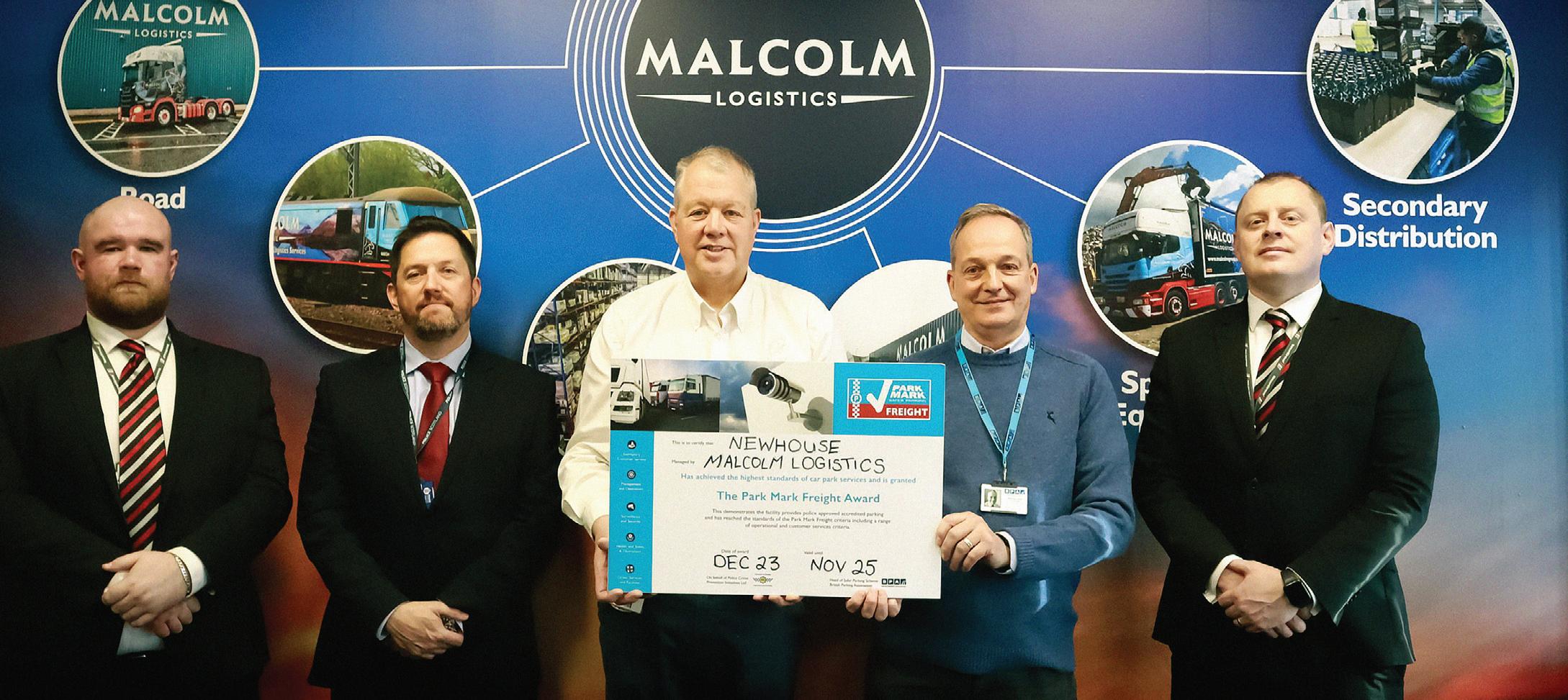
The Newhouse Freight parking facility has become the first recipient of the Park Mark Freight accreditation in Scotland. The scheme seeks to enhance the quality of lorry parks and facilities in services and operations.
To be granted Park Mark Freight, a parking facility must demonstrate a wide range of responsibilities, which include having low crime measures in place to enhance the security and safety of people and vehicles, good management and operations, and exemplary customer service. The assessments are run by Police Crime Prevention Initiatives and the British Parking Association
Derek Milne, security manager and health and safety advisor at Malcolm Logistics said: “I am immensely proud that Malcolm Logistics has successfully been awarded this certificate. It not only enhances our reputation within the logistics sector but shows the commitment to ensuring our customers’ products and businesses are secure while in Malcolm Logistics’ control. Our partnership with SecuriGroup has proved extremely successful in providing a secure and safe working environment.”
Russel Kerr, managing director, SecuriGroup said: “We are proud of the 8-year partnership, which has seen significant investments in cutting-edge security technology across Malcolm Group’s UKwide distribution network.”
The national Safer Parking Scheme recognises secure and well managed parking facilities
To achieve a Park Mark a car park has to achieve standards set out by the police. The Safer Parking Scheme sees facilities undergo a risk assessment that covers the management and maintenance of a facility, ensuring that there are appropriate levels of surveillance, lighting, signage and cleanliness. Car parks that pass the assessment can use signage featuring the Park Mark tick, so that drivers know exactly where to go for safer parking. Over 5,000 car parks currently have the Park Mark award. Sites in the Safer Parking Scheme are reassessed on a regular basis to ensure that standards are maintained.
The Park Mark was created by Police Crime Prevention Initiatives (CPI) as a way of reducing crime and the fear of crime. The scheme is administered by the British Parking Association (BPA), which operates a network of regional managers who liaise with parking operators and local police forces. The Safer Parking Scheme has recently been enhanced via the introduction of two new awards: Park Mark Plus and Park Mark Freight. Park Mark Plus assesses a range of criteria from services and operations to design and build. Park Mark Freight recognises the provision of managed parking and driver facilities that help to deter crime and reduce the fear of crime at all times within lorry parking areas.
The Park Mark scheme is run by the BPA in parallel to new Park Access scheme for accessible car parks.
The Red Lion Truck Stop in Northampton has retained its Park Mark Freight award. Operator Ali Sudrudin said: “Park Mark Freight is not only important but a necessity for the Red Lion Truckstop. It proves to our customers that we are striving to the highest standards for security and driver welfare, and it is justification for drivers to make the Red Lion Truckstop their only stop when looking for a safe and secure place to park.”
Colin Sproats, BPA area manager, said: “I am delighted that Ali’s team at the Red Lion Truck Stop has achieved the Park Mark Freight award, demonstrating their hard work and commitment to providing a safe environment for users.”
Sharon Henley, police assessor at Northamptonshire Police, said: “The lorry park provides excellent facilities incorporating all aspects of safety, security and exemplary management practices. Ali is a pleasure to work with, very amenable to all suggestions and very happy to go the extra mile in terms of security and the facilities he provides for the drivers.”

and
The car park at Doncaster’s Frenchgate shopping centre has been awarded the Park Mark Plus accreditation. Park Mark is the accredited logo of the Safer Parking Scheme, which is given to parking facilities that have achieved the requirements of a risk assessment conducted by the police and the British Parking Association. Their assessments include management and maintenance of the facility, checking that there are appropriate levels of surveillance, lighting, signage and cleanliness.
The award of Park Mark Plus demonstrates that a facility provides police-approved accredited parking and has reached the standards of the Park Access award as well as a range of environmental, structural, operational and customer service criteria.
Colin Sproats, BPA area manager, said: “I am delighted that Corrine and her team have achieved the Park Mark Plus award, demonstrating their hard work and commitment to provide a safe environment for users.”

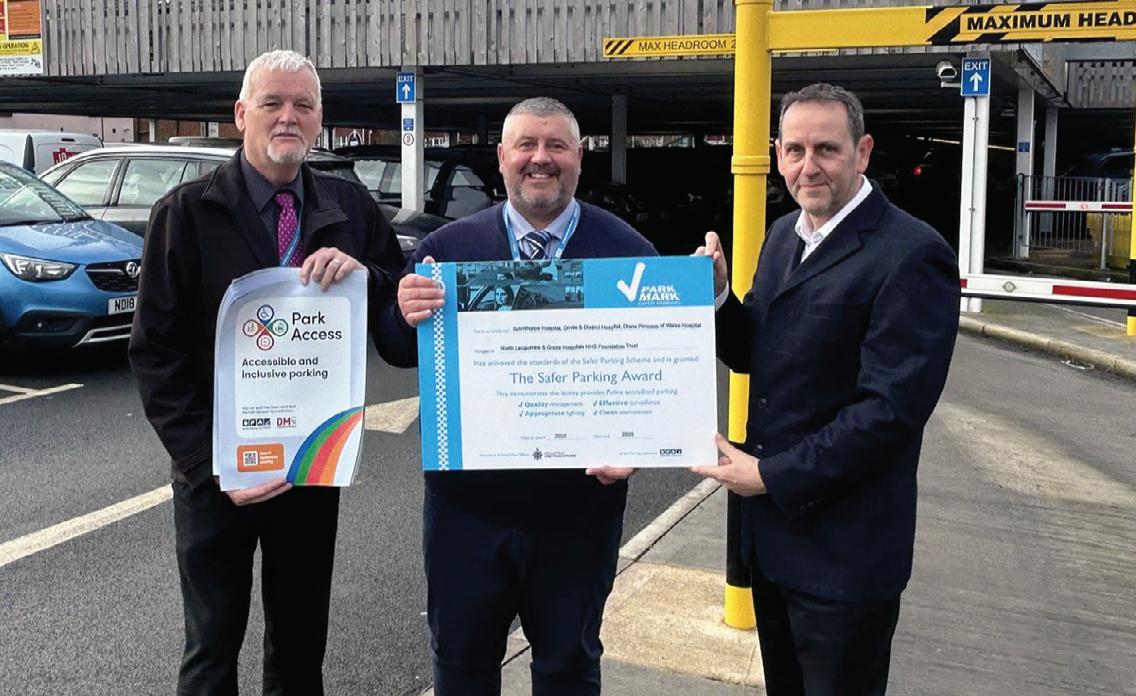
Northern Lincolnshire & Goole Hospitals NHS Foundation Trust has retained their Park Mark and also achieved Park Access status for all the managed car parks at Scunthorpe Hospital.
Phil Whale, security and car parking manager, said: “The award of the Park Mark and Park Access standards demonstrates our commitment to providing the highest standards of parking facilities and services. In partnership with Bidvest Noonan, the trust ensures the parking space provided is safe, accessible, and easy to navigate. The team managing our parking and keeping patients, staff, and visitor vehicles safe are real assets and we are thankful to them.”
Colin Sproats, BPA area manager said: “I am delighted Scunthorpe Hospital has achieved the Park Mark and Park Access award, demonstrating their hard work and commitment to provide a safe environment for users.”
Q-Park has been awarded two Park Mark Plus awards for sites in Edinburgh – the Q-Park Capital Square and Q-Park OMNI.
Rebecca Riley., Q-Park’s assistant business manager, Scotland. said: “Q-Park has worked closely over the years with the BPA and Police Scotland to maintain the high standards that are required for all Qpark car parks to achieve the Safer Parking Scheme Park Mark awards.
“This is a significant endorsement of ongoing investment to upgrade and improve our parking facilities and we are delighted to be awarded the Park Mark Plus. Our customers can be assured that QPark continually strives to provide safe, accessible parking, with clearly designated parking for parents with small children, disabled bays and the recently added electric charging spaces.”
William Clark, BPA area manager, said: “I am delighted that Q-Park has achieved these Park Mark Plus awards, which once again demonstrates their hard work and commitment to provide a safe parking facility for users.”
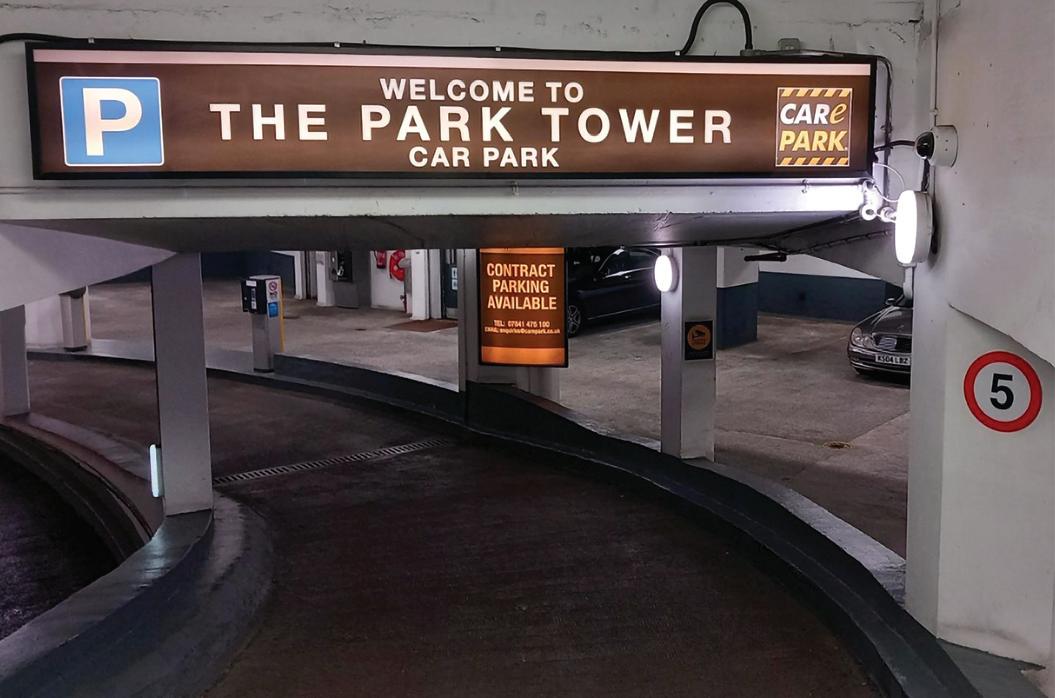

Two central London car parks managed by Care Park UK have achieved prestigious Park Mark awards. The Park Tower Hotel is located in Knightsbridge and Marble Arch in Westminster,
Patrick Agbeko, Care Park UK’s London operations manager, said: “Care Park has worked very closely over the years with the Metropolitan Police and the British Parking Association to maintain the high standards required for the Safer Parking Scheme Park Mark awards. I am delighted to have retained our accreditations.”
Julie Harty, Metropolitan Police Designing Out Crime officer, said: ”I have had the pleasure of working with Care Park for several years, most recently at their Park Tower Hotel and Marble Arch sites. Their engagement with the BPA and Metropolitan Police is outstanding and ensures customers can feel safe in the knowledge that their possessions are in safe hands.”
SMMT: One in 40 of all vehicles on roads now zero-emission
The number of vehicles on UK roads reached a record high in 2023, rising by 1.7% to 41,404,589 vehicles, according to new Motorparc data published by the Society of Motor Manufacturers and Traders (SMMT).
Plug-in vehicle sales drove what is the biggest growth in car ownership since 2016.
Total cars on the road rose by 1.6% or 546,800 units to 35,694,845, after almost half-a-million new battery electric (BEV) and plug-in hybrid (PHEV) vehicles were registered during 2023.
The number of BEVs in use increased by almost half (47.3%) compared with 2022, meaning zero-emission vehicles now account for 2.7% of all cars in use, up from just 1.9% in 2022.
The auto industry has repeated its calls for more rapid EV infrastructure investment to drive uptake as latest analysis shows just one standard public chargepoint for every 35 plug-ins on the road, a figure almost unchanged from last year. With the car industry now largely recovered from previous supply chain challenges that constricted deliveries in the aftermath of the pandemic, the SMMT says manufacturers have been better able meet robust pent-up demand.
Implied scrappage rates of older vehicles has also fallen to the lowest on record with British motorists keeping their cars for longer, with the average car on the road now nine years old – with the average age of a car up by more than a year since 2019.
Despite a record number of motors on the road, average car CO2 dropped -2.1% –while company car emissions plummeted by -11.5%, thanks to fiscal incentives encouraging fleets to invest in EVs and manufacturer investment in new lower and zeroemission models, says the society. Providing private consumers with similar incentives
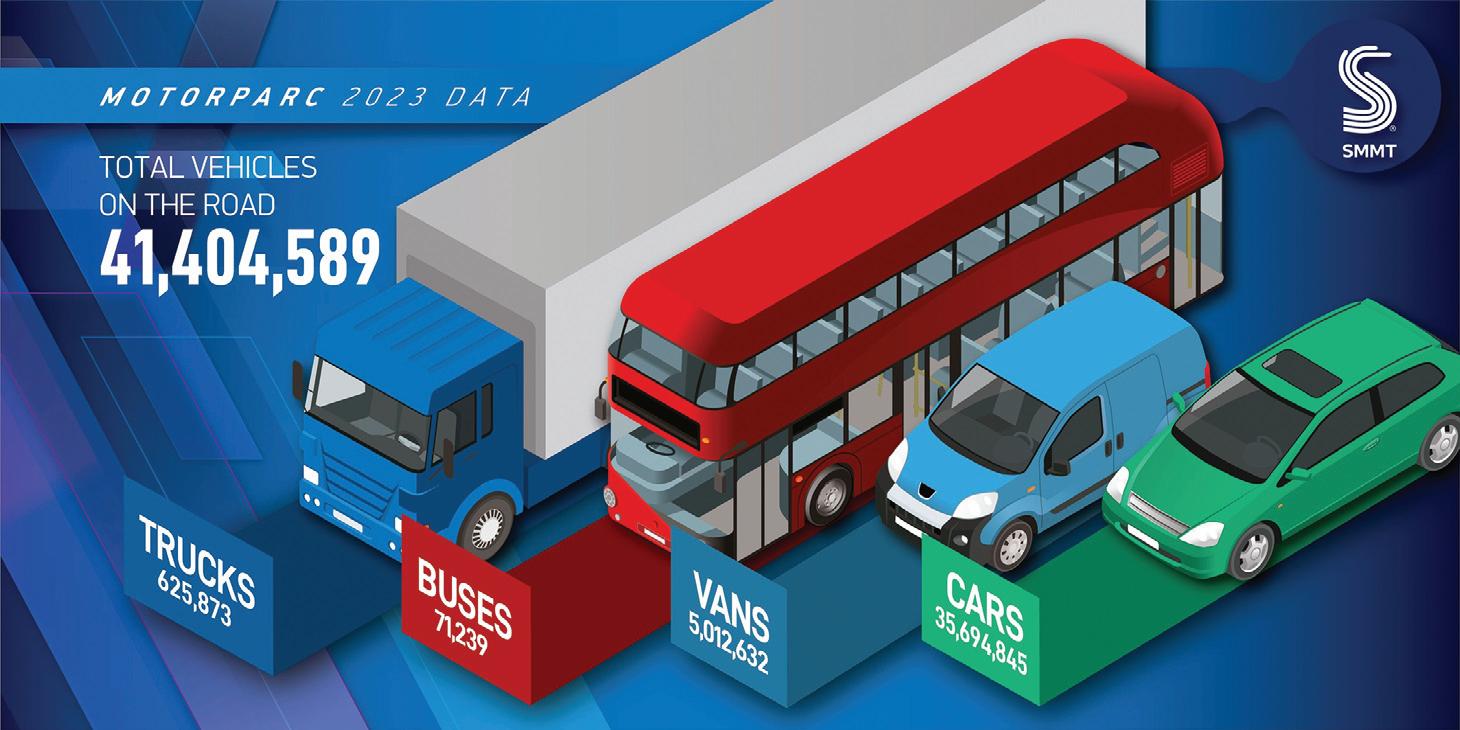
to switch would help dramatically decarbonise UK road transport, argues the SMMT.
Record numbers of commercial vehicles are now in use, with 625,873 heavy goods vehicles and 5,012,632 vans in operation, up by 1.7% and 2.6% respectively. Zeroemission workhorses also recorded a boost – with BEV van volumes rising by 43.5% on 2022 to 61,161, meaning 1.2% of vans on UK roads is now zero-emission.
Electric HGVs rose 146.4% in 2023, although at just 0.4% of the fleet, the SMMT says urgent action is required on grants and infrastructure – especially given that new trucks under 26 tonnes have the same end of sale date as cars and vans.
The number of electric buses in operation also grew, up by 159.4% to 1,922 units, making the UK Europe’s biggest market for zero-emission buses and coaches. However, despite a record year of registrations in 2023, the UK’s public transport fleet has shrunk to its smallest level since records began at 71,239 vehicles. In what it says is further evidence of the need for greater investment in this sector, the SMMT says one in five buses in use is more than 18years-old.
While overall EV use continues to grow, with 1,602,334 plug-in cars, vans, trucks and buses in operation, public chargepoint roll-out is still lagging. 2023 was the best year for public chargepoint roll-out, but the SMMT argues there is still just one standard public charger available for every 35 plugin cars on the road, only a slight improvement from one for every 36 last year.
The SMMT says the situation is even more challenging for commercial vehicles, with no clear national plan for van-specific chargepoints, and just one dedicated public truck charging location for the entire country. Mike Hawes, SMMT chief executive, said: “After two challenging years of constrained supply, more people and businesses across the UK are now getting back behind the wheel – and increasingly, opting for greener options. However, given the ageing fleet, we now need to encourage consumers and businesses who have deferred purchases of new cars, vans, trucks and buses to upgrade.
“A stronger and stable economy, coupled with reduced living costs, would boost consumer and business confidence, while compelling fiscal incentives would ensure that these purchases are emissions free.”
The number of public electric vehicle chargepoints in the UK has grown by 49% over the past year, says the Department for Transport (DfT).
There are now 59,670 public electric vehicle charging devices installed in the UK. Compared to 1 April 2023, the total installed devices has increased by 19,520.
During the first quarter of this year the total number of installed devices increased by 5,993, an increase of 11% compared to 1 January 2024.
When it comes to charging speed, 11,590 had 50kW of power or above, which represents 19% of all charging devices.
Some 35,339 had a power
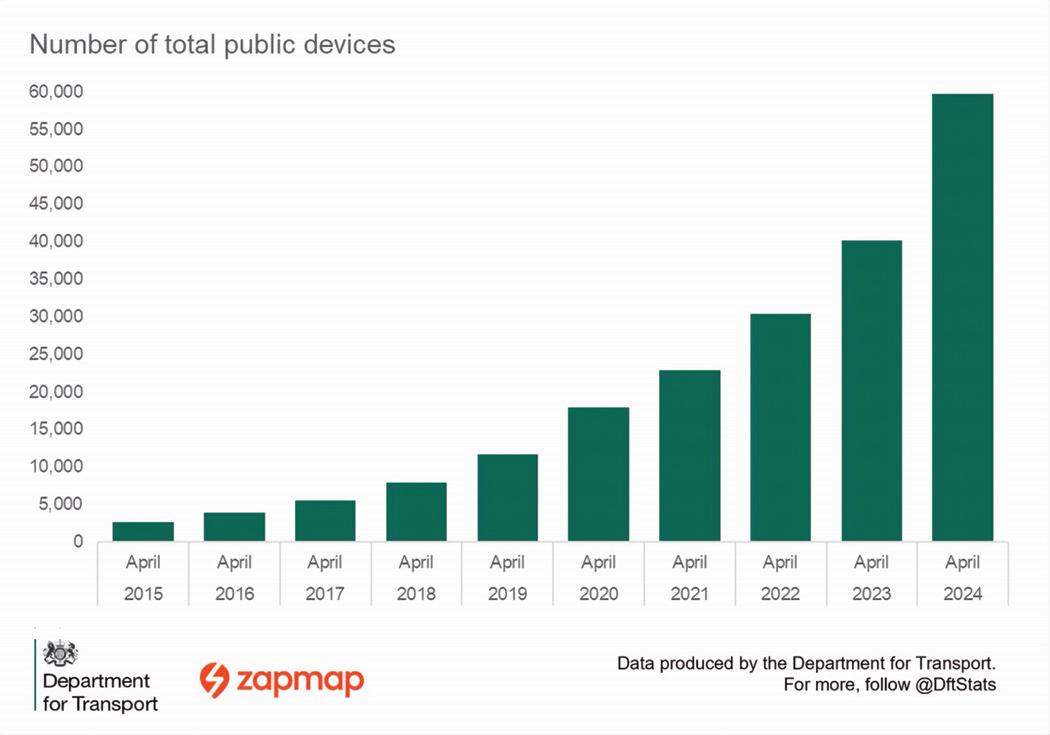
rating of 3kW up to 8kW, which represents 59% of all charging devices.
A total of 27,583 were
designated as ‘destination’ chargers, this represents 46% of all charging devices. In all, 22,199 were designated as ‘on
street’ chargers, this represents 37% of all charging devices
There was an increase in the number of public charging devices in all regions of the UK. London and Scotland had the highest level of charging provision per 100,000 of population, with 221 and 93 devices per 100,000 respectively. In comparison, the average provision in the UK was 89 per 100,000.
Northern Ireland had the lowest level of charging device provision in the UK, with 29 devices per 100,000, followed by the North West and Yorkshire and the Humber, each with 53 devices per 100,000.
The DfT presents data provided by Zapmap.
The government is not planning to cut the VAT rate for public charging. This is among the positions spelled out in its response to the House of Lords Environment and Climate Change Committee’s electric vehicle (EV) inquiry.
The committee’s report EV Strategy: Rapid recharge needed, published in February, warned that a combination of higher purchase costs, insufficient charging infrastructure and mixed messaging risks people not adopting EV cars. The government agrees with many of the committee’s recommendations, but disagreed with the report’s findings around equalising the VAT differential between public and domestic charging infrastructure and also disagreed with suggestions regarding offering incentives for the purchase of EVs.
The government also disagreed with: a call for the On-Street Residential Chargepoint Scheme (ORCS) to be continued alongside the Local Electric Vehicle Infrastructure (LEVI) fund; a ‘right to charge’ for tenants and leaseholders in multi-occupancy buildings; and mandatory ‘totem signs’ at the approach to motorways service stations with EV charging facilities.
The government reiterated that the Treasury has no plans to change VAT on public charging, stating that such a move would impose additional pressure on the public finances. The government said: “VAT is a broad-based tax on consumption and the 20% standard rate applies to most goods and services. Whilst there are exceptions to the standard rate, these have always been limited by both legal and fiscal considerations.
“Expanding the VAT relief already available would impose additional pressure on the public finances to which VAT makes a significant contribution. Although there are no current plans to change the VAT treatment of electricity supplied at public EV chargepoints, the government keeps all taxes under review.”
Also rejected is the Lords committee recommendation of targeted grants to help make EVs more affordable after the Plug-in Car Grant was ended in June 2022. The government said: “Government grants have been in place for over a decade to help reduce the up-front purchase price of new EVs. All government grants are kept under review to ensure the best value for money for the taxpayer. The Plug-in Car Grant was closed to new orders on 14 June 2022, having injected £1.5bn in taxpayer funding to support the growth of the early electric car market.
“In June 2022, the government published a public evaluation report, which highlighted that the Plug-in Car Grant was vital in building the early market for electric vehicles. It then had less of an effect on demand than other existing price incentives, such as company car tax. In 2023, battery electric vehicles (BEV) represented 16.5% of new car sales in the UK. The price gap for new cars has continued to decrease over the past few years. According to industry data, the purchase price premium of an EV – relative to an equivalent internal combustion engine (ICE) vehicle – has dropped from around 50% in 2020 to around 40% in 2023. With battery costs reducing and
The government intends to take powers to issue directions to Local Transport Authorities to produce local charging strategies


continued innovation, some external forecasts predict that some EVs could be around the same price to purchase as a petrol or diesel car by the end of the 2020s.”
In EV Strategy, the Lords had suggested the government to direct local authorities in areas where there are fewer than 50 public chargepoints per 100,000 people to prepare EV strategies. This will help to ensure a more evenly distributed chargepoint roll-out.
The government pointed in its response to the Future of Transport consultation on 25 October 2023, which made a commitment to working with Local Transport Authorities to update their Local Transport Plans to include EV charging strategies.
The government said: “Since the original consultation, many local authorities have taken positive steps towards planning for this infrastructure provision. When parliamentary time allows, the government intends to take powers to issue directions to Local Transport Authorities to produce local charging strategies, if they have not done so as part of Local Transport Plans. The Local Electric Vehicle Infrastructure fund requires applications from local authorities to be based on their electric vehicle charging strategies.”
The House of Lords report had suggested various actions on workplace charging. With the Workplace Charging scheme due to end in April 2025, the Lords committee had urged for an assessment of how the market-led rollout of workplace charging is progressing.
In response, the government said it will assess the impact that the grants have had on the market and consider if future incentives are proportionate. The government partially agreed with a call to consult on mandating workplaces that have designated car parking spaces and more than a certain number of employees to install chargepoints using the workplace charging grant. However, it stated that a review last year had shown that this
approach could incur complex leasehold impacts in certain ownership and land use arrangements. It said further evidence on the impact that minimum requirement powers would have on lease agreements was therefore required.
Areas where the government agreed with the Lords included the need for a strategic EV approach and public messaging. The government said it is taking proactive action to counter inaccurate information presented by the media on the subject of EVs. It also agrees with the recommendation to monitor prices of EVs in the leasing market and assess whether the leasing market continues to work well for consumers. The government said: “Alongside government, industry plays an important role in communicating factual information on EVs and charging infrastructure to consumers. The government will continue to work with industry to communicate the many benefits of transitioning to EVs.”
In reply to the government’s response, chair of the Lords inquiry, Baroness Parminter, said: “Whilst we welcome the government’s acceptance of some of the recommendations in our report, it is particularly disappointing that it is not committing to incentivising the purchase of more EVs, equalising the VAT differential between public and domestic charging, or addressing our concerns about barriers to charging in multioccupancy buildings.
“If implemented, these recommendations would help people to adopt EVs and ensure a smoother journey towards net zero. Peers will keep urging the government to do more, as otherwise the EV revolution is a non-starter.”



US electric vehicle maker steps up cuts as sales and revenues dip
Tesla has disbanded its Supercharger division, which operates over 50,000 Superchargers globally. The end of the Supercharger division was confirmed on social media by a number of employees.
Some industry executives and analysts suggest that Tesla’s owner, Elon Musk, has decided to disband the existing Supercharger organisation to build a leaner and less expensive team to run the operations.
Writing on his social media platform X (formerly Twitter), Musk said: “Tesla still plans to grow the Supercharger network, just at a slower pace for new locations and more focus on 100% uptime and expansion of existing locations.”
Tesla’s network of chargers recently signed deals with rival carmakers Ford and General Motors in North America to
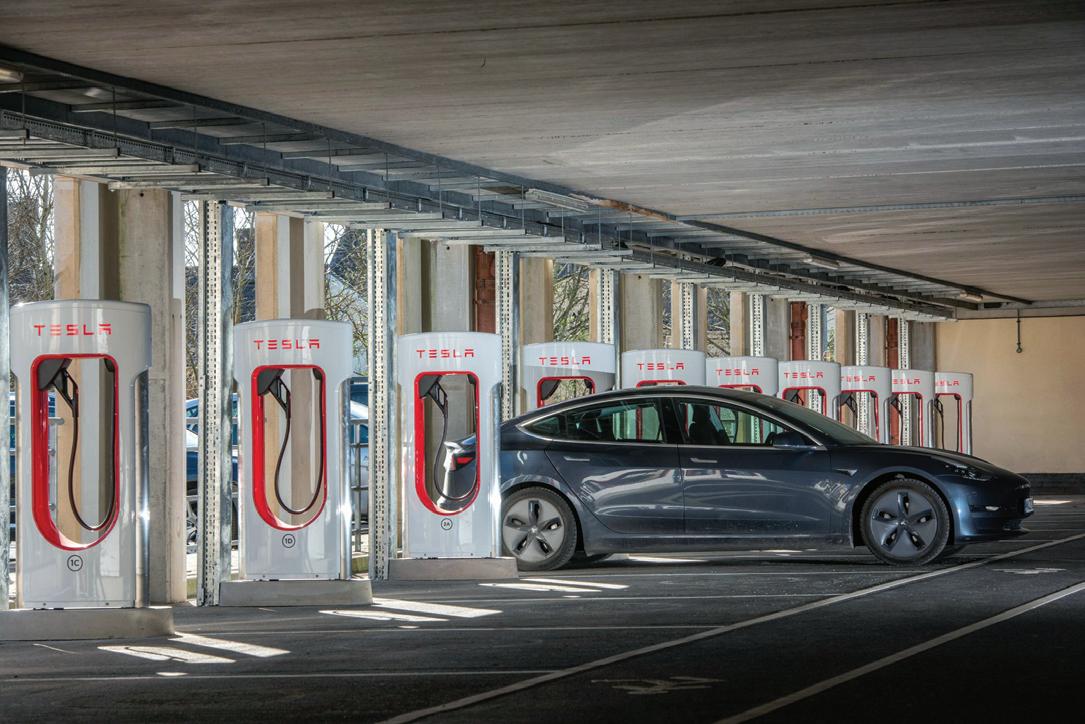
adopt its North American Charging Standard (NACS) system so that their vehicles could use the Supercharger network.
In separate statements, Ford and GM said they are not changing plans to equip their electric vehicles (EVs) with connectors that allow drivers of their EVs to recharge at Tesla stations.
GM said: “We have nothing new to announce regarding our plans. We are continuing to monitor the situation regarding changes to the Supercharger

Coventry University is helping to create technology to charge electric vehicles as they drive.
The university is contributing to a pioneering project to enable recharging of electric vehicles as they drive on power-enabled roads.
Coventry’s innovation focusses on the city’s longstanding expertise in automotive. Dynacov – short for “dynamic charging of vehicles” – uses dynamic wireless transfer technology to establish an automatic connection between subscribing vehicles and metal coils fitted below the road surface to recharge the vehicles’ batteries as they pass over and bill them for the energy consumed.
As cities move towards carfree centres, the university believes that Dynacov can keep
buses and goods deliveries moving without harming the environment.
The technology is one of six innovations proposed by the Key Cities Innovation Network (KCIN) in Civic Partners in Net Zero, a collection of peerreviewed studies detailing innovative ways in which universities are working with their local communities to achieve net zero targets.
KCIN co-ordinates universities associated with the cross-party group of 27 key cities across England and Wales – including Coventry –which is the largest grouping of urban authorities in the UK outside London. The studies, selected not only for local relevance but also their potential for replicating in other places, range from tech innovation and policy development to engaging local communities with climate science.
Local action on climate change was flagged as a priority by Key Cities last year, when it commissioned a study tracking the performance of local authorities across a range of climate indicators.
team and the potential impacts with no further comments or updates at this time”.
As well as the cuts to the Supercharger department, the firm’s entire public policy unit will also be cut, the Financial Times reported.
In a recent memo, reported by news website Electrek, Musk told staff there was nothing he hated more, but said that a reduction in headcount was something that has to be done. Tesla had 140,473 employees
globally as of December, according to its latest annual report.
This year Tesla has been facing problems. Last month Tesla reported lower first-quarter profits and its first quarterly revenue decline since 2021. Even after a subsequent surge, Tesla shares were down about 26% for the year.
Tesla is also having to deal with an investigation by the USA’s National Highways Traffic Safety Administration (NHTSA) into the safety of its Autopilot assisted driving system. There has also been a product recall relating to its new Cybertruck.
However, Musk continues to talk up the new. In a call with analysts earlier last month Musk said that he is focussed on opportunities in artificial intelligence, robotics and autonomous robotaxis.
Last month Musk visited China to discuss a potential rollout of its driver-assistance package in partnership with Chinese mapping and navigation services provider Baidu.
Delivery robot gets rebooted

South Korea’s Hyundai Motor Company and Kia Corporation have unveiled the new design of their DAL-e Delivery robot. It is based on a system introduced in December 2022. The new version features systems to improve delivery performance, particularly in complex settings, such as offices and shopping malls.
Drawing from the insights gained from Hyundai Motor and Kia’s previous conveyance pilot project, DAL-e Delivery has undergone significant improvements in both design and performance for swift and dependable delivery services in complex indoor environments.
To enhance driving stability, DAL-e Delivery is designed in a square column with rounded corners with the centre of
gravity at the bottom. The sensors are discreetly integrated.
DAL-e Delivery is based on four ‘plug & drive’ (PnD) modules, a mobility solution that combines a motor with steering, suspension, braking systems and environmental recognition sensors.
“DAL-e Delivery offers efficient and reliable food and beverage and parcel dispatch services to ensure customers receive goods promptly,” said Dong Jin Hyun, vice president and head of Robotics Lab at Hyundai Motor and Kia.
“Our vision extends to implementing infrastructure interworking across diverse spaces, including offices, restaurants and shopping malls.”
Startup incubation hub Etc. powers charger from streetside cabinet in East Lothian
BT Group has installed its first EV chargepoint powered from a street cabinet, marking the first phase of trials which could lead to the wider upgrade of cabinet units across the UK.
The charger is powered by a BT Group owned cabinet of the type traditionally used to store broadband and phone cabling. The installation forms part of a nationwide pilot looking at solutions to the shortfall in public EV charging infrastructure. The project is being operated by Etc., which is BT’s start-up incubation hub.
The first charger has been installed in East Lothian, Scotland, for use by local residents, who will be able to charge their electric vehicles at no cost until 31 May as part of the pilot.
Tom Guy, managing director, Etc. at the BT Group, said: “With our research showing that 78% of petrol and diesel drivers not being able to conveniently charge an EV as a key a barrier to purchasing one, and the UK behind government-set sustainability targets, it’s critical that we start looking at existing infrastructure to drive innovation at speed.

“These trials present a unique opportunity to tap into existing assets to drive the important transition to electrification in the UK, and we’re proud to be working with local councils in East Lothian and more widely across the UK at this critical stage and to play our part.”
The pilot will focus next on West Yorkshire, with ambitions to scale up to 600 trial sites across the UK. EV drivers can use the chargepoint with ease by downloading the trial app from the App Store or Google Play Store.
The app is designed and developed by the Etc. team in conjunction with EV drivers and includes the features they most want to see, such as visibility of EV chargers across the UK, alongside real-time pricing, availability and charge speed, the

ability to start, stop and monitor charge sessions via the app and to filter by connector type, kW speed and charging network.
EV owners can connect their EV to the app to get live updates on battery levels, smart estimated costs and charge times, and access their charging history.
Throughout the pilots Etc. at BT Group will test elements ranging from the digital customer experience to engineering and technology choices, planning and local engagement, operational and commercial options.
Where Zapmap data predicts that there are currently just 5,052 public EV chargers in Scotland, Etc. has identified up to 4,800 street cabinets that could be used for potential upgrade in Scotland to meet increasing demand.

Chargers with their cables cut
Rapid charging network InstaVolt is cracking down on crime following a spate of cable cutting incidents that has left chargers unusable.
InstaVolt has seen more than 20 EV charging sites across the Midlands and Yorkshire targeted by gangs since
November. The cost is running into hundreds of thousands of pounds.
Chief executive Delvin Lane said: “Although these sites are targeted by organised crime gangs, it’s a misconception that the copper brings real financial gain. The value of any metal
Norman Hampshire, East Lothian Council leader, said: “East Lothian Council has a strong track record of supporting innovative vehicle charging solutions in public places to accelerate the transition to an electric future. During the design of this trial we worked with BT Group to ensure the charger would be fully accessible, and that trailing cables would not get in the way of pedestrians and others using the pavement.
“We are pleased that BT Group is supplementing the wide range of public chargers in East Lothian as this allows the council to focus on its public service role of providing charging options in areas less attractive to commercial operators.”
The East Lothian trial was welcomed by Fiona Hyslop, cabinet secretary for transport in the Scottish Government, who said: “This is an exciting and innovative development in the provision of electric vehicle charging so I’m really pleased that the first trial in the UK is taking place in East Lothian. This government is committed to supporting people to make the switch from petrol and diesel vehicles, and our vision for Scotland’s future public EV charging network highlights the need for private sector finance and delivery to build on our significant investment in the network to date.”
stolen is insignificant. The thefts just cause disruption to EV drivers – including those in the emergency services – looking to charge their vehicles.”
The company has introduced robust measures around its charging stations to deter any further damage including: installing extra CCTV; introducing security patrols; using SmartWater to tag property and utilising tracking devices to ensure InstaVolt cables can be identified.
Lane added: “We are taking this very seriously and are engaged with the police at all levels. We are calling on the industry to come together to use the full force of the law. It’s not just the thieves we’re after, but also the scrap dealers who are handling this stolen product.
“The EV revolution is already under way with more than 1,000,000 EVs on the road. Our mission is to make EV charging as easy as possible, and reliability is one of our core values. As an industry we need to be giving drivers confidence that they will be able to charge their car and we need to see swift law enforcement against the criminals causing disruption to EV drivers.”
Drivers can use app to schedule off-peak charging sessions
Chargepoint operator Connected Kerb is rolling out smart charging across its nationwide public network following a successful trial last year.
Connected Kerb’s smart charging allows drivers to schedule charging during off-peak hours when energy is cheapest and greenest, saving money, cutting carbon and reducing pressure on the grid.
The roll-out, set to begin in April, will see the majority of Connected Kerb’s activated to be capable of smart charging by 2025.
Connected Kerb predicts its public smart charging offering will see lower overnight tariffs of £0.45 per kWh for drivers, extending the full benefits of smart charging to everyone. Drivers could save up to £222 per year on charging, the equivalent of 495 free EV miles –enough to drive from Exeter to
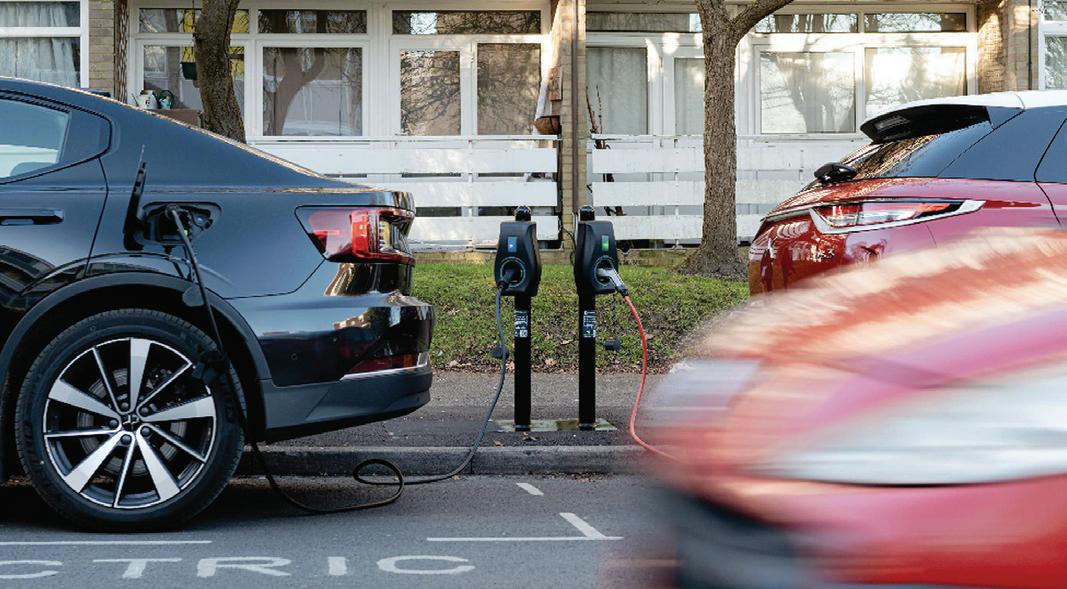
EV transition as a whole, bringing our public charging network one step closer to democratising the gap between those with and without off-street parking.”
Connected Kerb’s smart charging will initially be rolled out in Lincoln, Scarborough, Ryedale and Sunderland.
Edinburgh. Collectively, the company estimates this could see an annual savings of £1.5bn for drivers by 2030.
It is projected 11 million EVs will be on the UK’s roads by 2030. However, Connected Kerb is concerned that costs remain a key barrier to mass adoption.
Some 62% of drivers are without access to home charging and have not been able to benefit from these lower electricity tariffs at off-peak times.
Ben Boutcher-West, chief digital officer at Connected Kerb, said: “Public smart charging is the catalyst we need to create a
fairer, greener, and cheaper charging network. We know that just under two thirds of people in the UK don’t have access to a home charger, which is why we’re committed to levelling the playing field between those who can access smart charging and those who can’t.
“By increasing the speed of charging when energy is cheapest, we can now offer drivers lower-cost tariffs, maximise the use of green energy and take strain off the grid. Our rollout of public smart charging isn’t
Smart charging on Connected Kerb’s network will be available to users through its newly launched mobile application, enabling the quick, easy, and convenient setup of overnight charging. The updated app features session tracking, providing users with live updates, so drivers can keep tabs on their charging remotely.
The company’s app displays recommended chargepoints, as well as those in use, making it easier for drivers to find the most convenient chargepoints.
The app also features easy registration, simple payments (including both Apple and Google Pay), alongside extra tips and tricks to get the most out of


Hartlepool Council has launched a trial of Kerbo Charge through-pavement channels that make it possible for residents with street parking to safely charge their electric cars at home.
When residents want to charge their EV, they insert their charging cable and the self-closing lid snaps down shut behind.
The solution removes the risk of trips and falls from trailing charging cables across footways and the slim and shallow channel seamlessly integrates with the pavement surface, minimising disruption to existing infrastructure. The
channel is made from a highstrength thermoplastic, meaning it is not a target for metal thieves.
The gulleys are being entirely paid for by the residents.
Kieran Bostock, Hartlepool Borough Council’s assistant director, neighbourhood services, said: “We are pleased to be working with Kerbo Charge on this trial which aims to make it easier and less expensive for residents who don’t have off-street parking to charge electric vehicles.”
Kerbo Charge is being tested by local authorities, including Central Bedfordshire, Milton Keynes and Nottinghamshire.

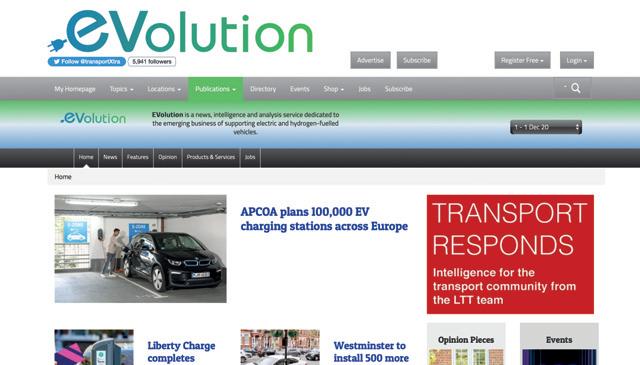








































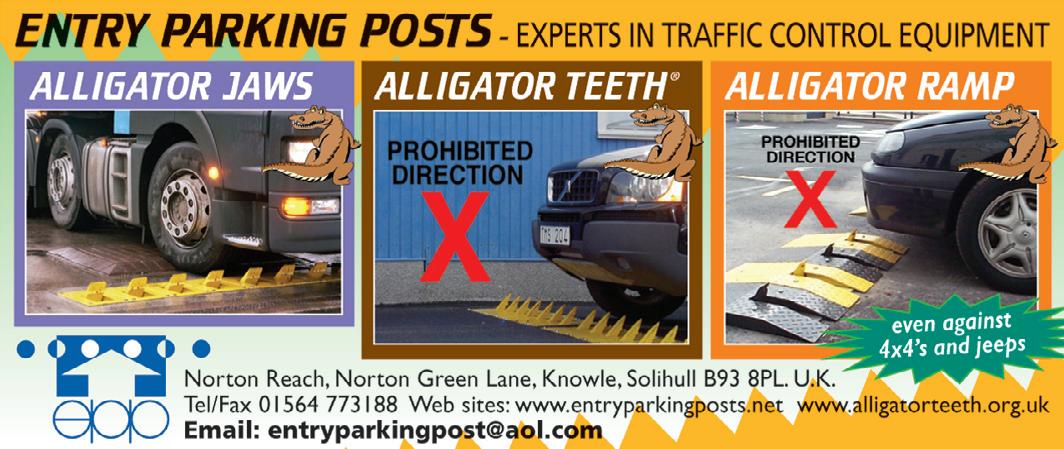

The Leading Independent Consultancy for all your parking solu琀ons
Established in 1991, with over 230 sa琀s昀ed customers comprising both public and private sector (including Local Authority and Health and Educa琀on establishments). Quality parking solu琀ons provided by our experienced in house specialists:
GIS mapping and surveying
• MTO site surveys and digi琀sing.
• On street TRO signs and lines: legality and condi琀on surveys (sample surveys also available).
• GIS mapping of TRO surveys, produc琀on of digital maps and TRO management for Order wri琀ng, upda琀ng and consolida琀on.
• Data extrac琀on and conversion of text based schedules to digi琀sed map based solu琀ons.
• Length of stay, usage, and occupancy parking surveys, both on and o昀 street.
• Compliance surveys and data analysis.
• Surveying and mapping of infrastructure assets.
Contact:


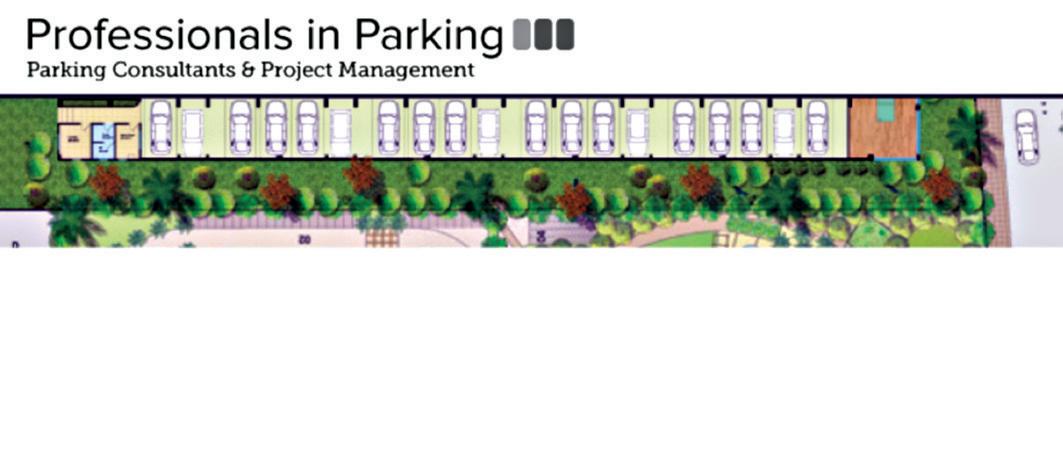
Consultancy services
• Financial appraisal and e�ciency reviews of parking service provision.
• Collabora琀ve working – joint no琀ce processing and shared enforcement.
• On and O昀 street tra�c regula琀on order wri琀ng.
• DPE and CPE feasibility studies and implementa琀on.
• Tari昀 reviews.
• DPE/CPE services speci昀ca琀on wri琀ng and tender evalua琀on. RTA
Peter Lowe B.Eng., C.Eng., M.I.C.E., FBPA
Tel: 01492585055 or 07900264137
Email: plowe@rtaassociates.co.uk
www.rtaassociates.co.uk

For more information on our services, please contact:
Lauren Appleby (North) lappleby@newlynplc.co.uk 07931 811088
Shaun Byrne (South) sbyrne@newlynplc.co.uk 07964 764099
